SIBLINGS IN STRIDE College
Credit Plus gives Dobos siblings academic and career boosts
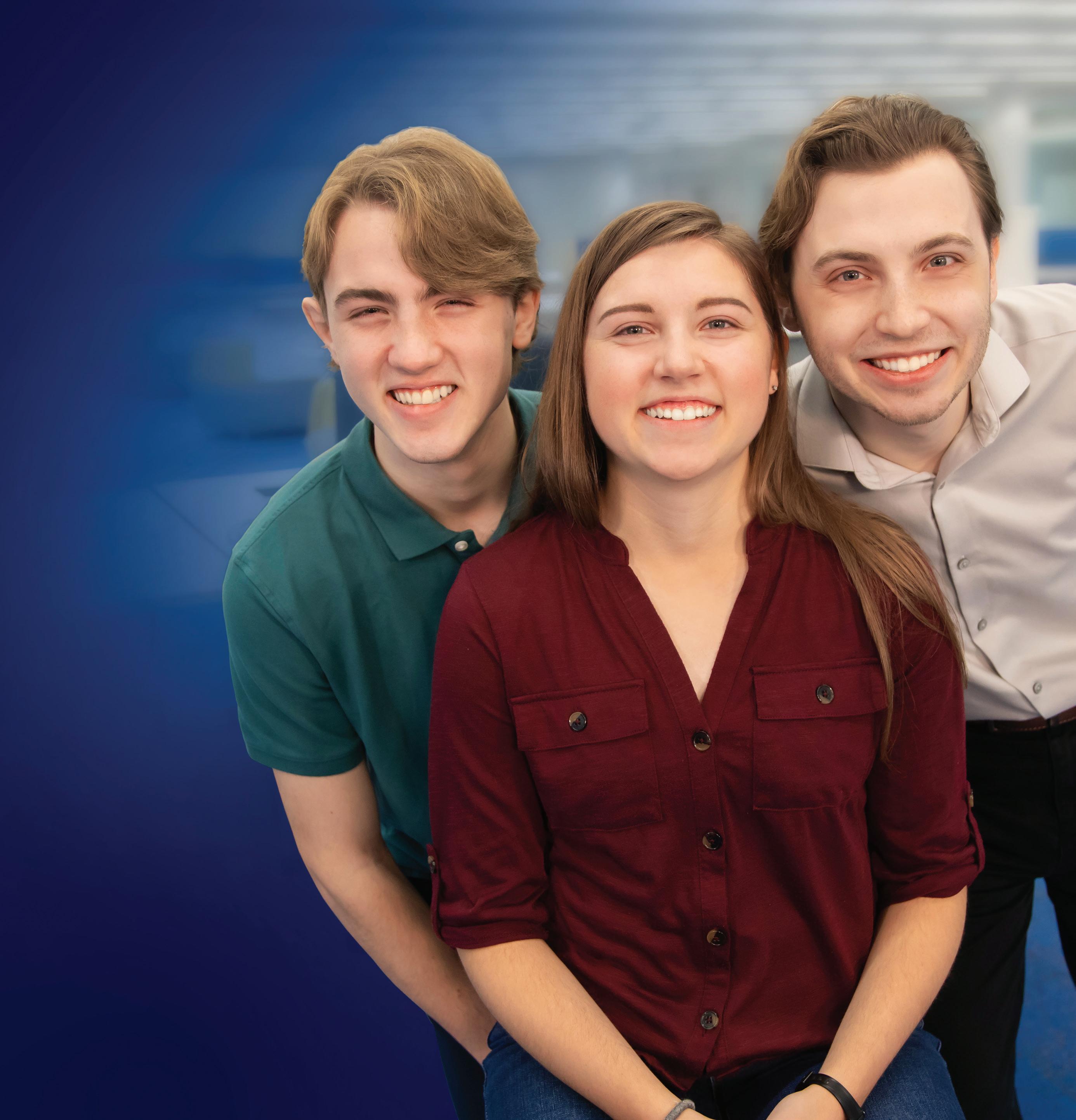
PLUS: New bachelor’s degree in smart manufacturing drives industry automation
Coca-Cola Bronze Scholar fuels an ambitious future with a powerful past Army National Guard soldier begins a new healthcare career
Bring this Cover to Life! SCAN
LORAIN COUNTY COMMUNITY COLLEGE ISSUE 10
In this Issue:
15 SIBLING STRIDE
How College Credit Plus gave each Dobos sibling an academic boost
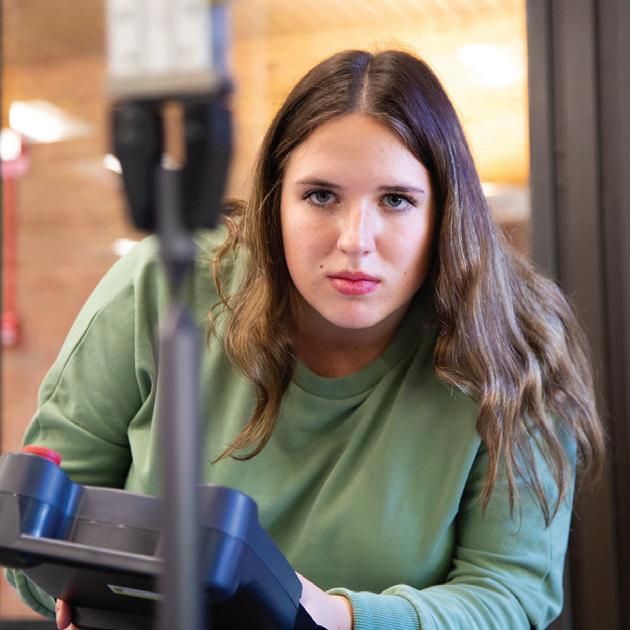
18
Microbiology professor Dr. Harry Kestler guides the next generation of researchers
20
Florence Nightingale nursing award winner
Bianca Young is prepared to advocate for future patients

22
GLOBAL
LOCAL
Trace and authenticate microchip company
finds its high-tech manufacturing home at LCCC
24
Coca-Cola Bronze Scholar Kwabena Agyemang’s powerful past fuels his ambitious future
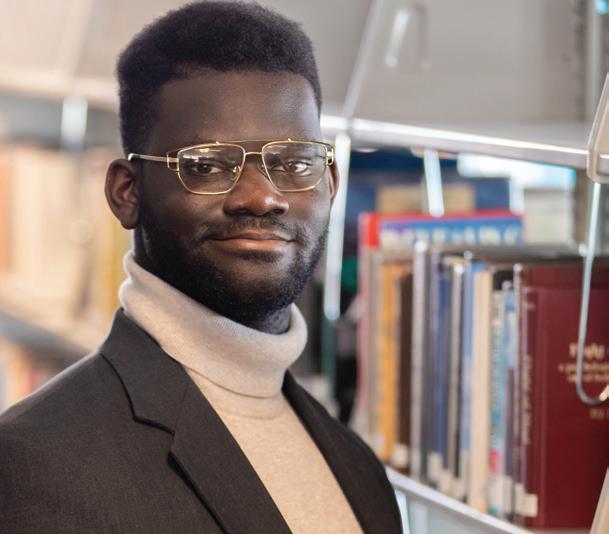
When
Jasmine
North Abbe Road
Ohio 44035 Phone: 800-995-5222
1005
Elyria,
lorainccc.edu
ALWAYS HERE ALWAYS READY
Guard soldier Sariana
begins a new healthcare career
TURNING A LOSS INTO A GAIN
4
National
Rivera
26
BRIDGING THE GAP
Jackson lost her job but LCCC’s earn and learn program led her to a new career 8
Bridges to Success to introduce high school seniors to in-demand careers
THE PURSUIT OF ACADEMICS
LCCC pilots
10
was ready to drop out of
doctorate program she pulled from
LCCC past
RAMPING UP ROBOTICS
Bachelor of Applied Science in Smart Manufacuring drives industry automation
Nadja Payton
her
her
12
New
UNDER THE MICROSCOPE
QUIET
BUT MIGHTY
IMPACT,
COMMITMENT
POWERFUL PERSPECTIVE
A
Recently, Lorain County Community College was one of just 10 community colleges in the country selected for “Unlocking Opportunity: The Post-Graduation Success and Equity Network.” The initiative from the Aspen Institute and the Community College Research Center is focused on improving students’ post-completion outcomes by delivering credentials of value.
I’m thrilled to join the Unlocking Opportunities network and build upon the progress LCCC has already made in this area. In the nearly 60 years since LCCC’s founding, more than 44,000 students have earned degrees in the fields needed most by local employers. More than 90% of LCCC graduates live and work in Northeast Ohio—a direct testament to the career-ready education and training they receive at LCCC and the lasting impact this has on our community.
While the end goal of Unlocking Opportunities is a credential or degree in an in-demand field, we know how important it is to set up our students for academic success at the very beginning of their journey. And the earlier that journey begins, the better.
That’s why College Credit Plus is such a critical part of our students’ postsecondary success and, ultimately, career readiness. Ohio’s College Credit Plus program allows students to earn college credits while in high school, all for free.
Unlocking Opportunities for Students
At LCCC, we see first-hand the benefits this program provides our students. The most tangible benefit is, of course, cost savings. More than 50% of Lorain County high school graduates earn college credit from LCCC, saving their families millions in college tuition. And, for those students paying for college themselves, the program decreases future loan amounts, lessening the financial burden college graduates might one day carry as they begin earning family-sustaining wages.
Just as impactful though, is the intentional bridge College Credit Plus creates from high school to college and career. The program offers an early introduction to endless possibilities, as students explore academic pathways that interest them and lead directly to in-demand careers.
As you flip through this issue of Opportunity, you’ll read about many students, including the Dobos siblings on the cover, who took full advantage of all that dual enrollment offers. Our K-12 partnerships run deep, and College Credit Plus will continue to serve as the backbone of those partnerships, helping students unlock every opportunity to create the positive beginnings that lead to improved post-completion outcomes.
Marcia J. Ballinger, Ph.D. President, LCCC

3 opportunity
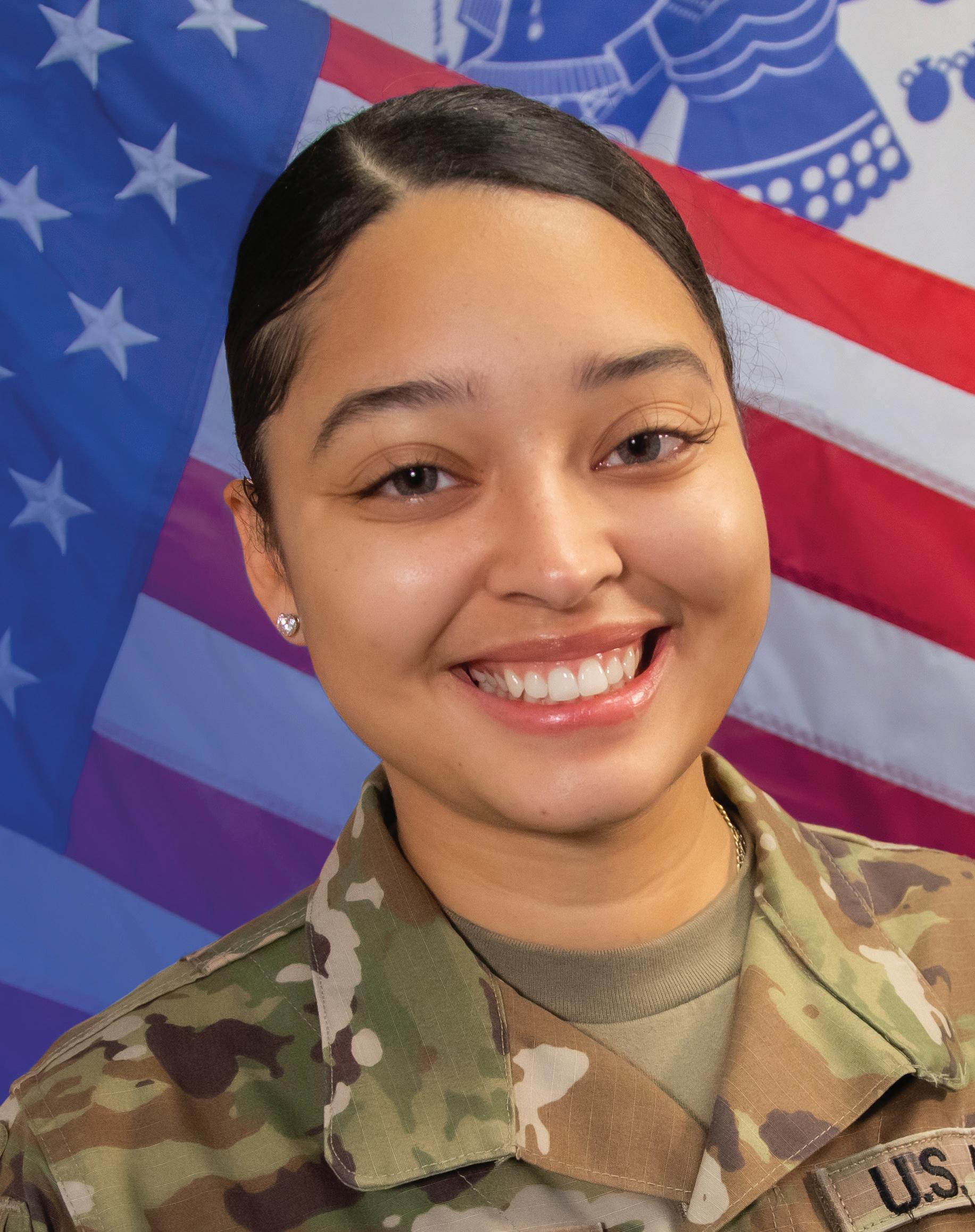 4 Lorain County Community College
SARIANA RIVERA
4 Lorain County Community College
SARIANA RIVERA
VIDEO
LCCC GRADUATE AND STUDENT
Breathtaking. That’s the word Sariana Rivera used to describe the Lorain County Community College commencement ceremony she attended in 2019. At 18, the Lorain woman graduated with her associate of arts degree, and her high school diploma from Lorain High School at the same time through Lorain County Early College High School.
“My parents encouraged me to do Early College,” Rivera says. “And the more I looked into it, the more I saw that it was a great opportunity to knock off some college and finish high school with a degree.”
Rivera made a home at LCCC, bonding with her fellow classmates and her instructors. But the draw of an oncampus college experience pulled her west. She attended Arizona State University for one semester before homesickness set in, after which she transferred to The University of Toledo and began studying nursing.
Then the pandemic hit. Dorms closed and Rivera moved home. She considered enrolling at LCCC, but worried online courses weren’t how she learned best.
So, Rivera put college on hold and joined the United States Army.
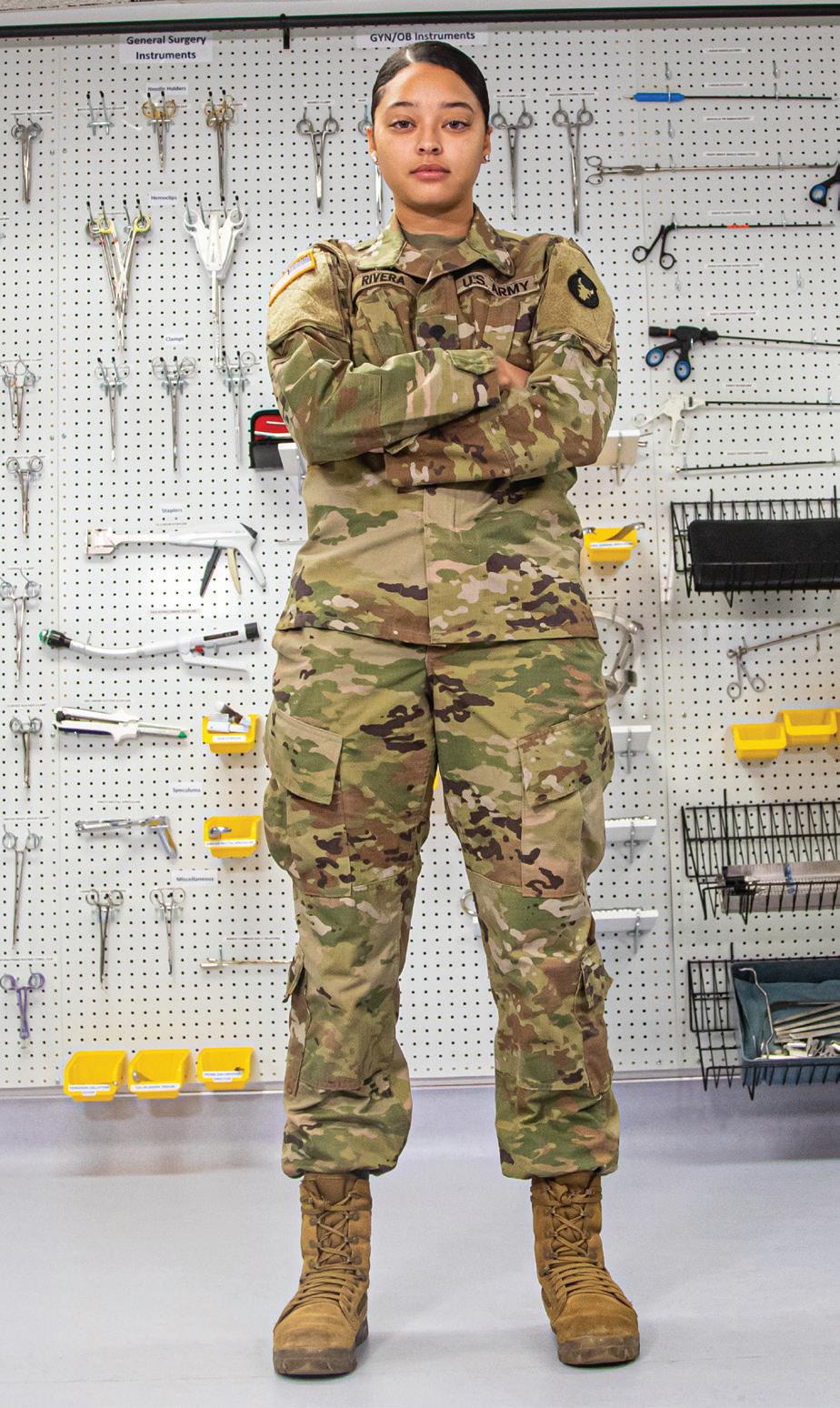
After active duty in the Army National Guard, LCCC grad Sariana Rivera returns to LCCC to become a surgical technologist
5 opportunity I Always Here Always Ready
“My parents were shocked, because I had always told myself I wouldn’t join; it just wasn’t me,” Rivera says. “I don’t know how the idea got in my head, but I contacted a recruiter and signed on.”
Award-winning active duty
In June 2020, Rivera enlisted with the Army National Guard and by October was in South Carolina for basic training. After that, Rivera went to Advanced Individual Training in Virginia for three months where she trained to be a petroleum supply specialist. Known as 92-Fox, these specialists are primarily responsible for supervising and managing the reception, storage and shipping of bulk or packaged petroleum-based products.
When not on active duty, Rivera committed to spending one weekend each month training. But, at the time, the nation was reeling from the COVID-19 pandemic.
“We went active duty and began helping out in hospitals,” Rivera says.
Between Northeast Ohio and Columbus, Rivera worked in emergency rooms and on labor and delivery floors. The experience showed Rivera that, despite what she once thought, the Army was in fact for her.
“When the hospital staff saw the National Guard come in, in our uniforms, they were thanking us. We were there to help them,” she says.
Rivera says the most impactful experience from that time was when a woman came into the emergency room moments from giving birth.
“It was just me and the nurse,” Rivera recalls. “The nurse was calming the woman down while coaching me through delivering the baby.”
Rivera received an award from her command sergeant major for her actions that day. The recognition came during demobilization, where members of the National Guard meet after active duty to talk about their mission experiences. “Our command sergeant major picked certain people from the symposium crowd to highlight, and I was one of them,” Rivera says.
Finding a future career goal
The active-duty experience, during which Rivera also assisted in several cesarean sections, solidified her future career goal – to be a certified surgical technologist.
“They are standing right next to the surgeon, serving as their right hand and handing them everything they need. That’s big,” she says.
In the operating room, the certified surgical technologist is the expert technical team member in perioperative surgical management. They maintain patient safety as a sterile member of the surgical team, including management of all sterile fields, technical equipment, supplies, and instrumentation involved in the surgical process. And the United States Bureau of Labor Statistics projects an 8.7% employment growth rate for surgical technologists through 2023.
To gain the education and work experience she needed, Rivera went straight to a familiar campus that has always been ready and steady – LCCC. The college was also among the first in Ohio to receive the state’s Purple Star Award for its commitment to veterans.
Rivera connected with LCCC’s Veteran and Military Service Members Center and immediately had a team of fellow veterans rallying around her. The team’s first task, led by Navy veteran and LCCC career and academic advisor Esperanza Correa, was to get Rivera enrolled in the surgical technology program for fall 2022, even though the deadline had passed.
“Espy worked with me right away to figure out all my admission forms, help line up my Federal Tuition Assistance, and contact the program instructor,” Rivera recalls. “She got me in; she was great.”
Putting skills into practice
In fall 2022, Rivera began the Associate Degree in Surgical Technology program, where students learn the principles and practices of surgical procedures and functions in the operating room.
“We teach with compassion for our students and their future patients,” says Korrine M. Anderson, program coordinator and assistant professor for LCCC’s Surgical Technology program. “We strive to cultivate a culture of success and promote rigorous performance standards based on continuous improvement and best practices within the surgical environment.”

6 Lorain County Community College
Once students master their skills in the lab, they move on to a three-semester clinical rotation. Rivera plans to begin her clinical training at the Cleveland Clinic in fall 2023.

“In Northeast Ohio, we are fortunate to have many wonderful healthcare institutions,” Anderson says. “Our program has affiliations with 21 different clinical sites.”
Rivera expects to graduate in December 2023 and hopes to land a permanent position at the Cleveland Clinic once she earns her degree. As she plans her post LCCC graduation goals for a second time, she’s doing so knowing that, while college, career and the National Guard might pull her in many different directions, Lorain is always home. And LCCC is always ready.
“It gives me a sense of security and relief knowing I have a great school to go to right at home,” she says.
ORAINCOUNTY COMMUNITYCOLLEG E
SUPPORTING OURVETERANS
“It gives me a sense of security and relief knowing I have a great school to go to right at home.”
L
7 opportunity I Always Here Always Ready
BRIDGING THE
LCCC pilots Bridges to Success program to introduce Avon High School seniors to in-demand careers
For many high school seniors, a common question looms over their last year: what’s next? Lorain County Community College’s Bridges to Success program helps high school seniors answer that question and build an action plan.
The program, funded by a grant through the Ohio Department of Education, was piloted in partnership with Avon High
School during the 2021-2022 academic year. More than 20 students explored career pathways that lead to industryrecognized credentials and in-demand careers in advanced manufacturing, computer and information technology, healthcare, and entrepreneurship. Students connected with LCCC faculty and engaged with local industry partners through customized hands-on labs and workshops. After completion, students could choose to pursue a short-term certification and seek employment or continue on in their educational pathway. “Bridges to Success is designed to develop our local talent pipeline,” said Deanna Strauss Hersko, manager, K12 Career Technical Pathways & Programs
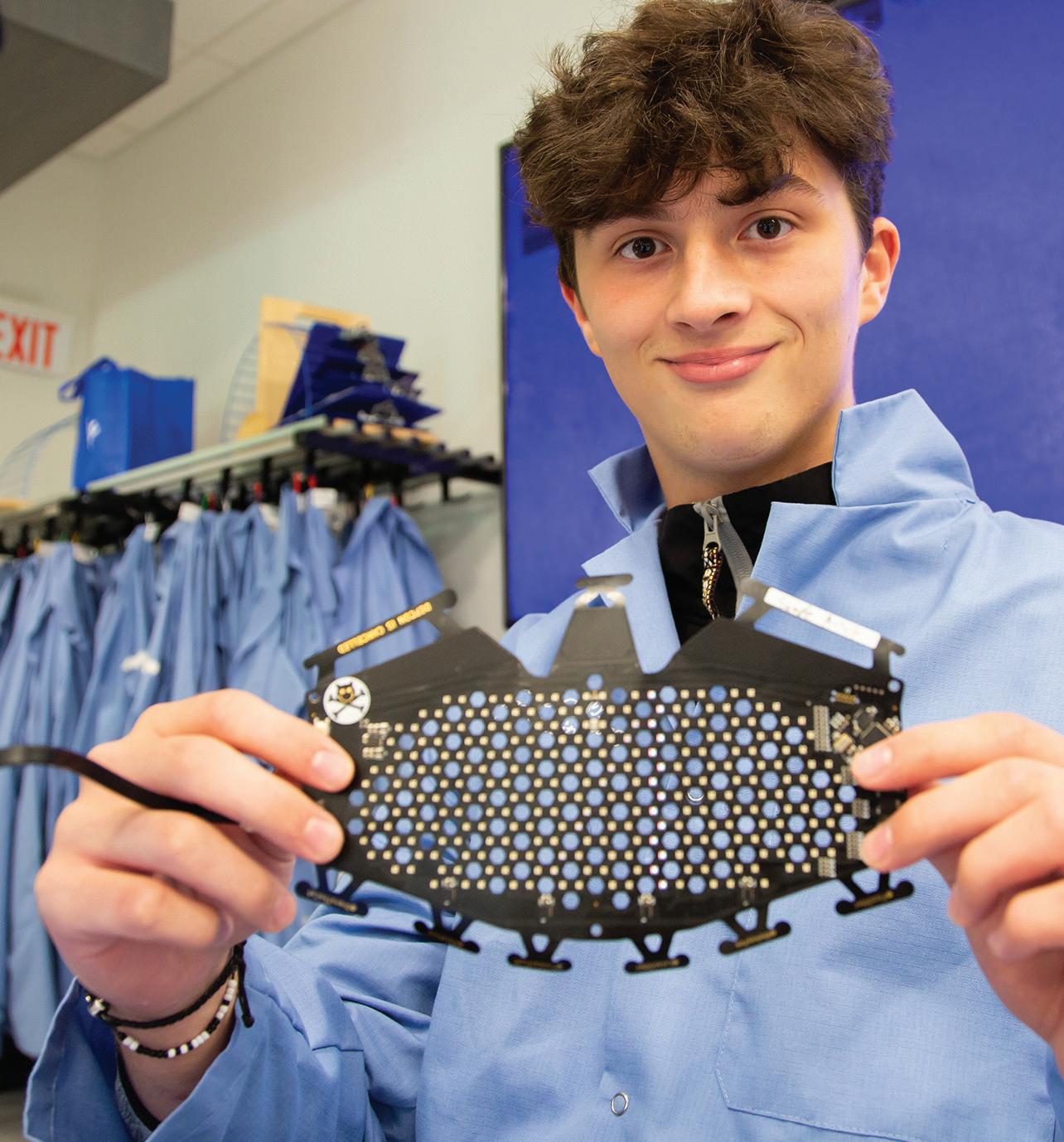
at LCCC. “Bridges puts students on a pathway to earn an industry credential, which validates the skills they possess and provides students with early employment opportunities.”
Participating students also earned LCCC credit, by taking student success and career exploration courses, cumulatively saving over $4,000 in tuition. Avon High School graduate Vince Ventresco says his experience in Bridges to Success introduced him to LCCC and confirmed the college would be part of his next step.
“It was a no-brainer for me. I really didn’t want to spend all that money on an expensive college tuition and live in a dorm somewhere,” Ventresco said.
Ventresco, who added that LCCC’s student-to-instructor ratio was also a positive, wasn’t alone in his thinking. More than half of the students who participated in Bridges to Success enrolled at LCCC the following fall. Part of the staying power comes from students finding the right career path, which is what Bridges to Success is all about.
“We targeted our invitations for Bridges to Success to those who were without direction for post-secondary goals,” said Avon High School principal, Kristina Dobos Buller. “When presented with a free exploratory option, a scholarship of sorts, doors opened for students. It was incredible to watch our students feel valued by LCCC’s investment in them.”
8 Lorain County Community College
STUDENT VIDEO
VINCE VENTRESCO LCCC
GAP
While co-designing the program’s deliverables, Avon’s school counselors shared that every district has this undecided population of students to support. They believed Bridges could be a model program delivered throughout Lorain County, and they were right; LCCC has been approached by several districts to explore how to take Bridges to Success from pilot to implementation.
Once students decided to enroll in LCCC post-graduation, the program connected them with various scholarships, including priority placement into LCCC’s Students Accelerating in Learning (SAIL) scholarship program. In all, Bridges to Success students earned scholarships valued at over $45,000, some from the state’s Choose Ohio First Scholarship Program, which supports undergraduate students in STEM-focused academic programs.
After rotating through the various academic pathway workshops, from cooking classes to cleanroom tours, Ventresco, along with two other students, decided LCCC’s Bachelor of Applied Science in Microelectronic Manufacturing (MEMS) was the right choice for him.
For Buller, the Bridges to Success model proves to students – and their parents –that providing focused opportunities for post-graduation can lead to success for those whose plans are not yet made. “Parents glow when we speak of the program,” Buller said. “Each parent has complimented the bridge that was actually forged for his or her student from high school classrooms to postsecondary options. Previously unknown opportunities are at their children’s fingertips. That’s our goal.”
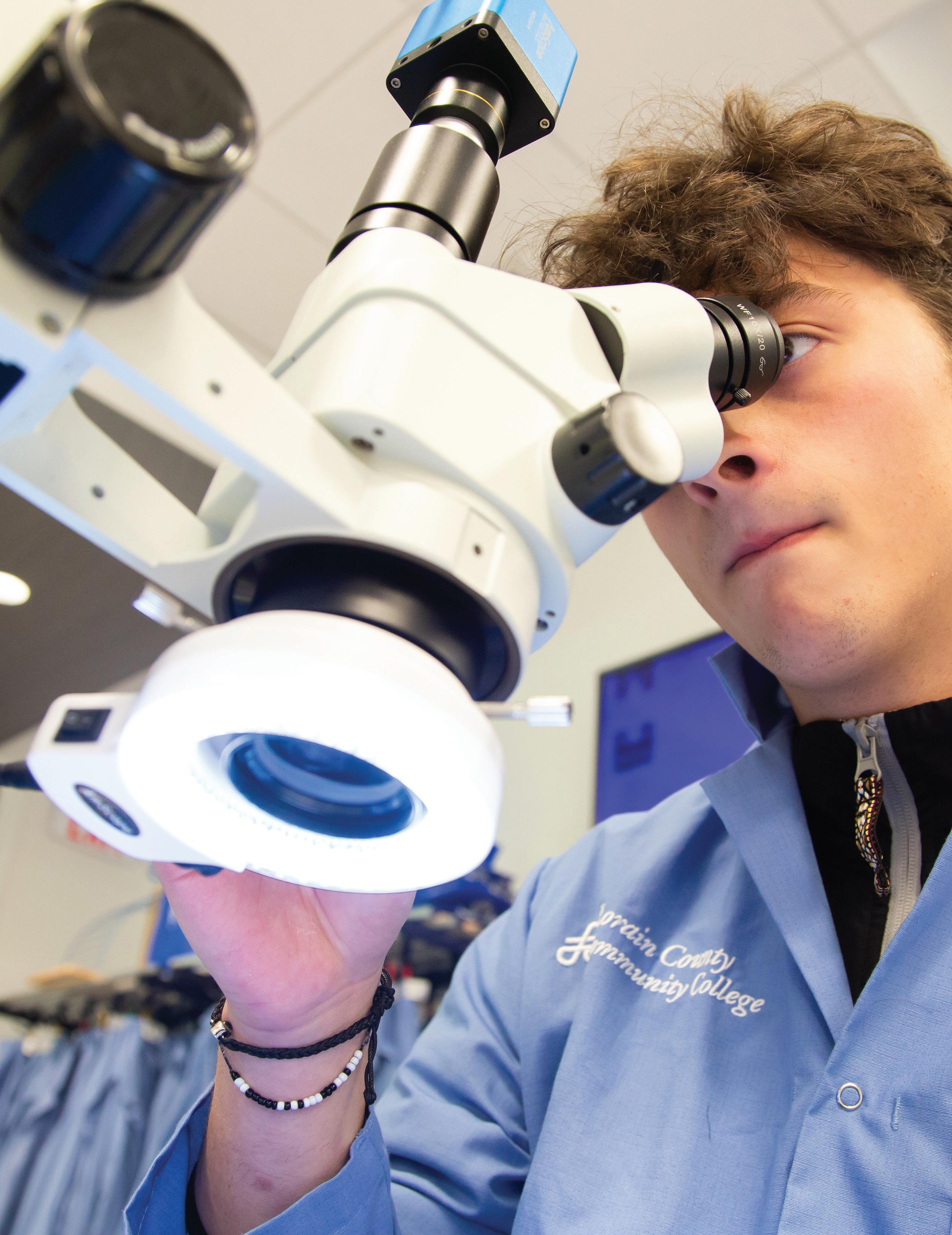
9 opportunity I Bridging the Gap
“It was incredible to watch our students feel valued by LCCC’s investment in them.”
Avon High School principal, Kristina Dobos Buller
The Pursuit of Academics

Nadja Payton was one click away from dropping out of her doctorate of education program. But she pulled from her experience in Early College High School and persisted.
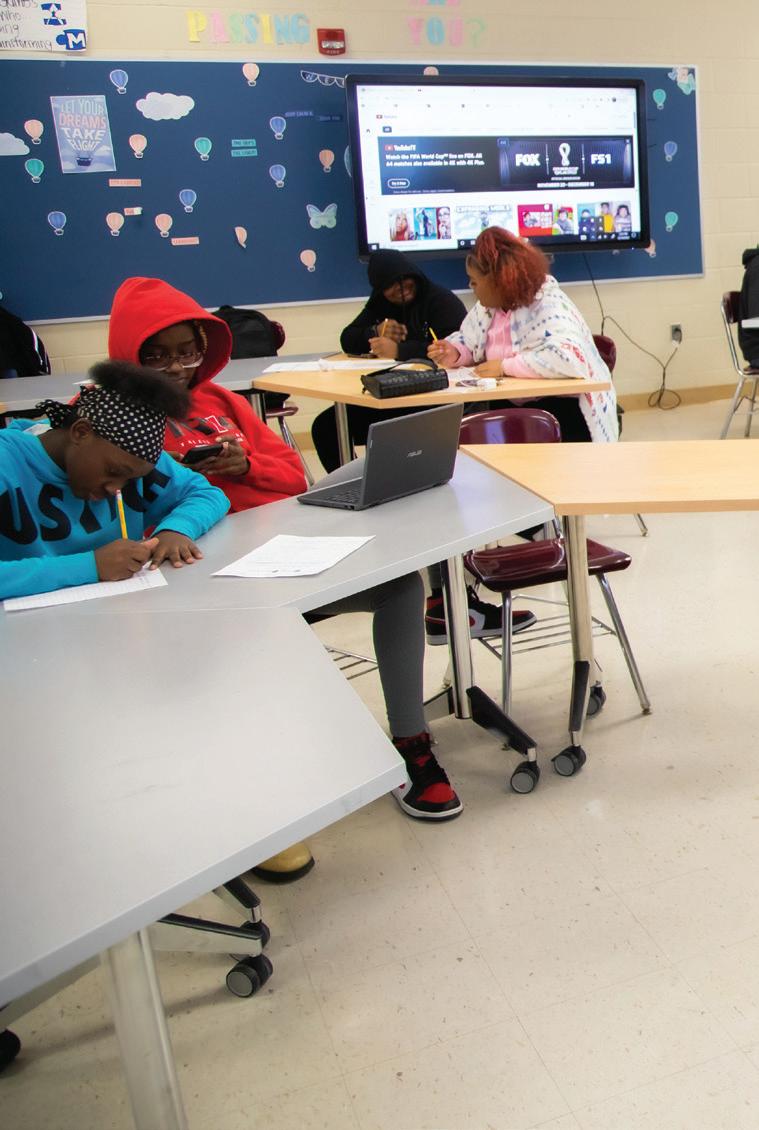
It was 4 a.m. on May 24, 2022, and Nadja Payton lay in her hospital bed with her newborn son resting on her chest, her laptop at her side. She was in the final year of her Doctor of Education program at the University of Dayton, mere months from turning in her dissertation. Payton’s son, whom she calls Tripp, was born two and a half months premature, and he and Payton had been in the hospital for 30 days since his birth. Payton was physically exhausted, and mentally drained, and full of self-doubt. She began typing emails to her academic advisor, her committee members, and her committee chairperson.
“I was hanging on by a thread,” Payton recalls. “I told them I was going to drop out, take some time off, that there’s no way that I was going to produce, by December, what they wanted in a dissertation.”
But Payton never hit ‘send’ on those emails. Instead, she leaned into her trusted support system— her mother, grandmother, sister, advisors, and classmates — and she kept going. By December, Payton, who is an intervention specialist at John Adams College and Career Academy, published a dissertation that underscores the importance of special needs students’ inclusion in the general classroom and ways to overcome common barriers.
“I am proud,” she says. “And I’m excited to share my research with my principals so we can make some positive, equitable change to help our students succeed and achieve.”
For Payton, overcoming challenges in the pursuit of academics is nothing new. And the commitment Payton needed to reach her final higher education goal felt much like the commitment she needed to reach her first higher education goal. Payton is a 2012 graduate of the Lorain County Early College High School Program, where high school students spend all four years taking courses on the Lorain County Community College campus, earning their diploma and associate degree at the same time.
The program is geared toward firstgeneration college students and helps families forgo the cost of a two-year degree. The Lorain native says attending Early College High School was the right choice – it just wasn’t hers. At the time, Payton’s older sister was two years into the program and thriving, so her mom chose the same route for her.
“It was challenging, but I learned eventually that was just high expectations,” Payton says. “The professors had high standards for us. And that’s what I needed.”
Those high standards and expectations helped mold and mature Payton faster than she thinks a traditional high school setting would have. And while Payton was worried about missing out on some experiences with friends, her Early College High School class bonded in ways she never expected.
“It wasn’t long after that ninth-grade year that I was able to say, ‘OK, this is where I’m supposed to be,’” she says. “We made our own little community here, and it was amazing.”
The LCCC campus felt so much like home to Payton that after graduating from Early College High School in 2012, she enrolled in LCCC’s University Partnership program. Within three years, Payton earned her Bachelor of Arts in Psychology from Cleveland State University. And she followed that degree with a Master of Education in Special Education and Teaching.
“Early College High School set me up for success in so many ways,” Payton says. “I still thank my mom every day for forcing me to attend.”
Payton says it wasn’t her teaching career that pushed her toward earning a doctorate degree, but she did in December 2022.
“I wanted to do something for myself as a personal goal, and I am very proud,” Payton says. “When I was writing the acknowledgments in my dissertation,
10 Lorain County Community College
EARLY
PARTNERSHIP
VIDEO
NADJA PAYTON
COLLEGE HIGH SCHOOL GRADUATE & UNIVERSITY
GRADUATE
Academics
I made sure to include everybody that literally held my hand until I made it to that finish line.”
Those final months of graduate school will forever live in Payton’s mind as one of the most trying times of her life, but she says the foundation built during her Early College High School years helped her overcome the doubt and succeed. And her struggles and triumphs are now tools she uses in the classroom.
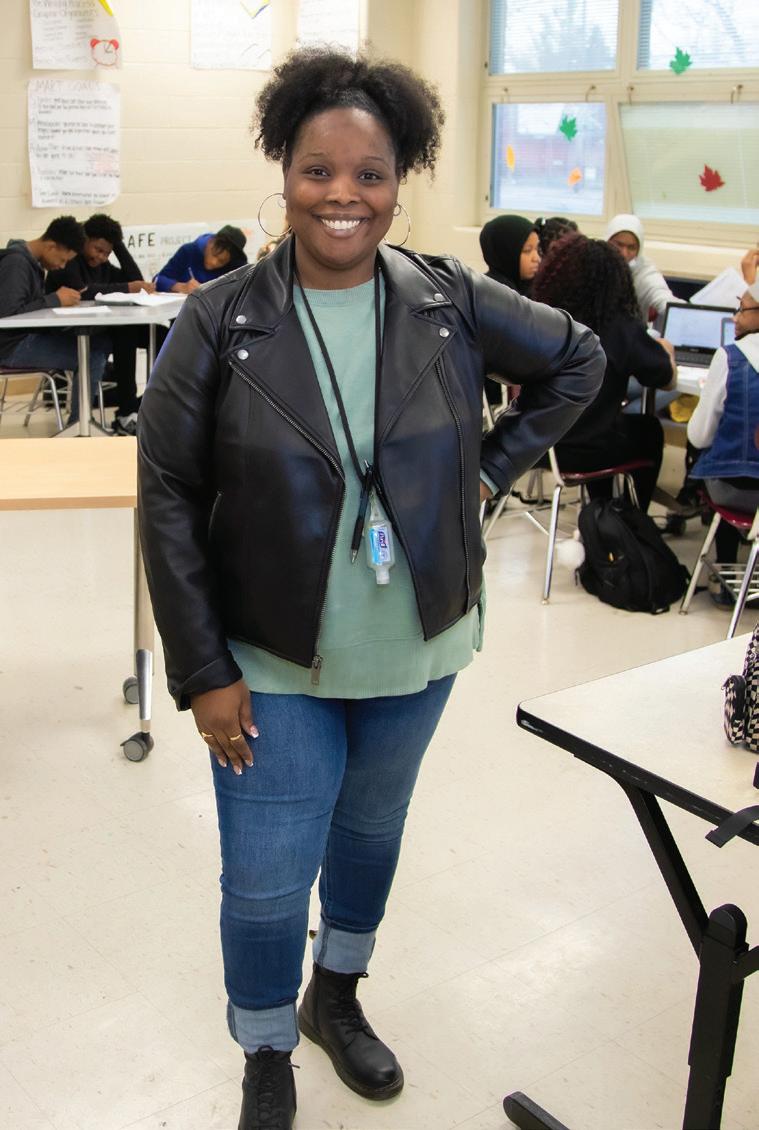
“If my students complain about homework or that I’m making them write a five-paragraph essay, I can say that I understand,” she says. “I get to be empathetic. But I also get to encourage them because I’ve been there before.”
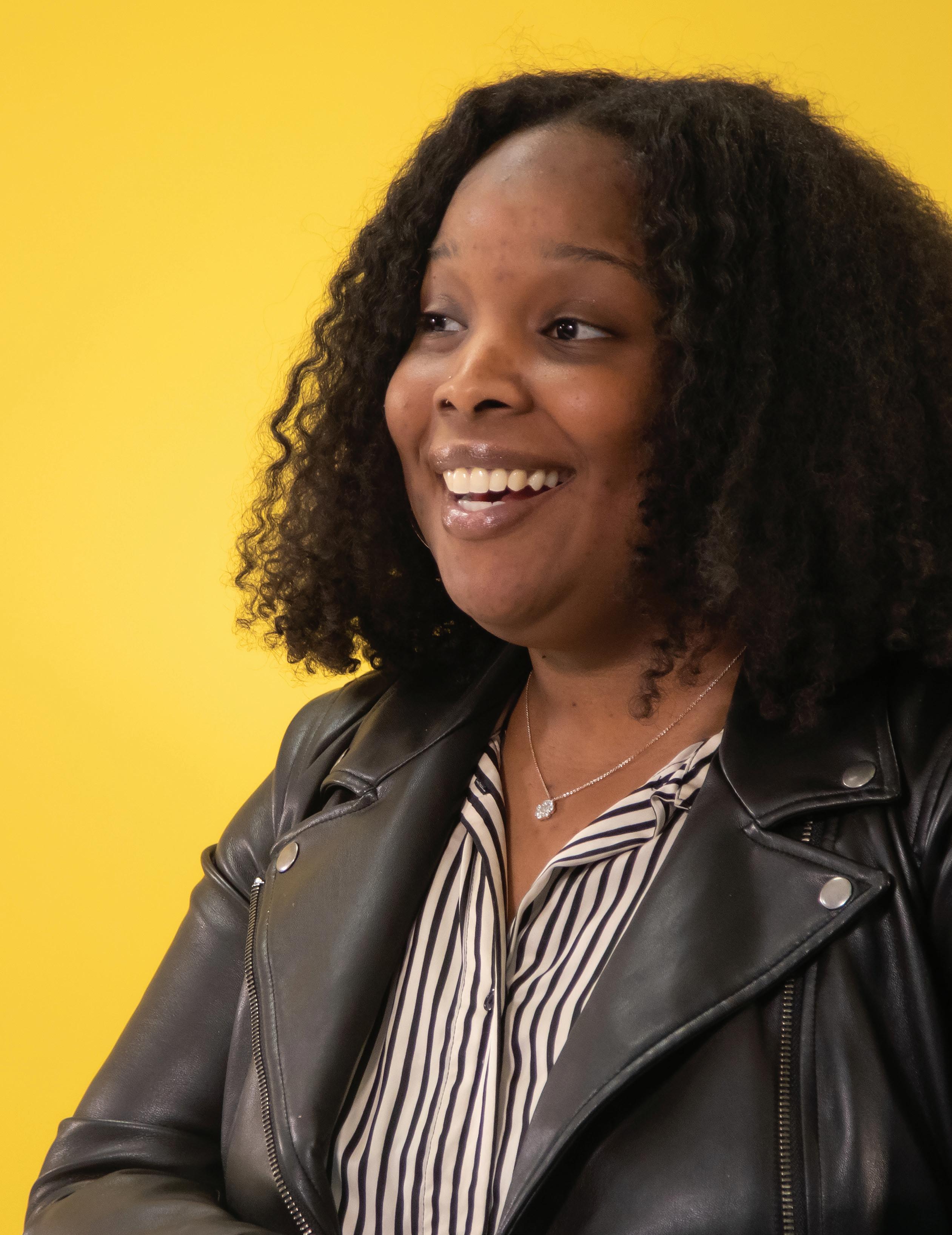
11 opportunity I The Pursuit of Academics
“Early College High School set me up for success in so many ways.”
RAMPING UP
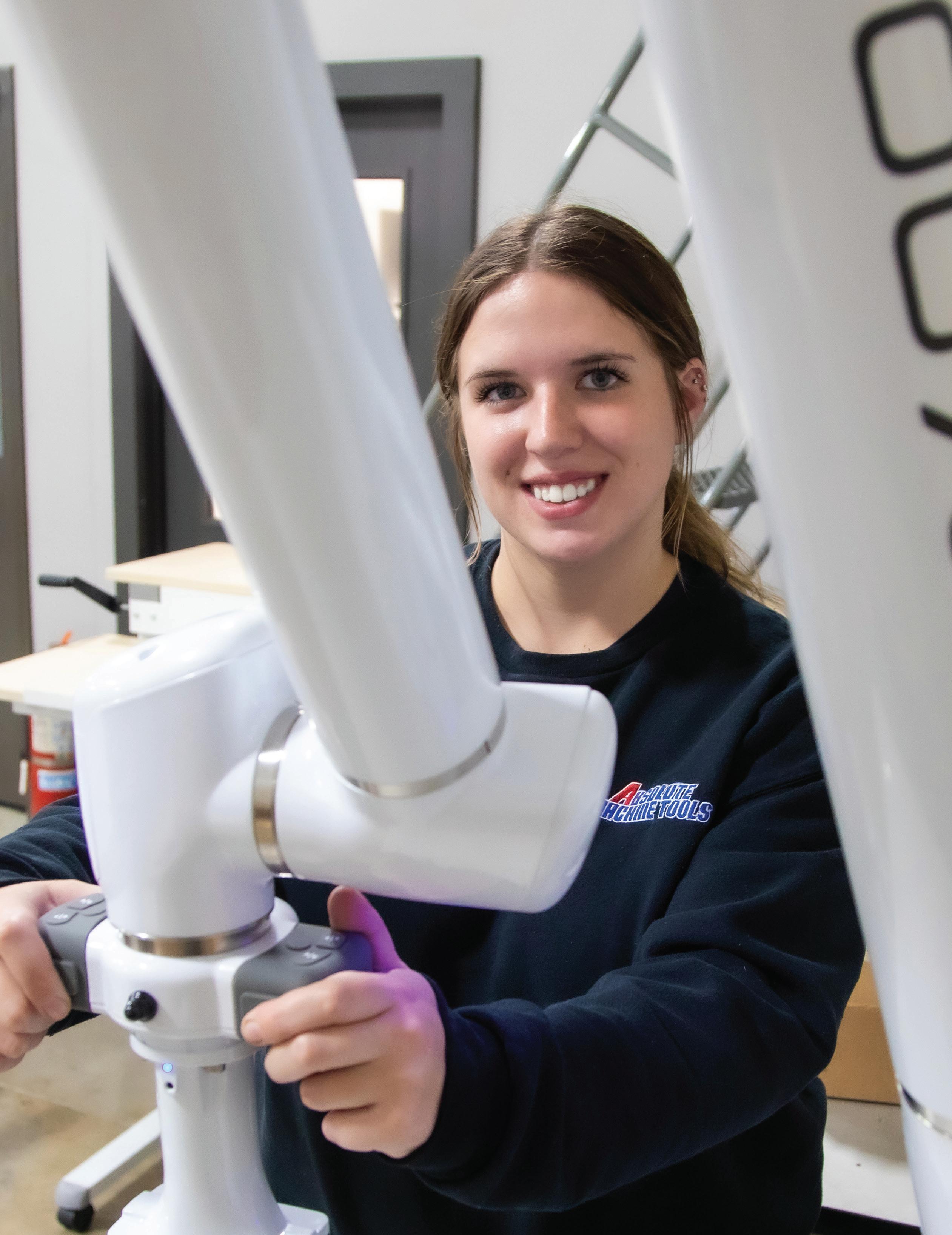
12 Lorain County Community College
EMILY GRAVEN LCCC STUDENT
VIDEO
“I have learned a lot at work, but the college has opportunities to teach me new things that I can bring back to the job.”
UP ROBOTICS

Absolute Machine Tools helped design LCCC’s new Bachelor of Applied Science in Smart Manufacturing — now the Lorain company is enrolling employees

If anyone says manufacturing is a trade of the past, they’ll be met with an emphatic “absolutely not” from David Zunis. He’s director of service & applications engineering at Absolute Machine Tools, which has been importing and selling CNC machinery for 35 years. Most recently the company has been forecasting the future of the industry and ramping up its turnkey automation and robotics departments. And they’re doing so, in part, to fill holes in the workforce.
“We’re pressing more and more toward automation because the people just aren’t there. We’re not replacing jobs, we’re filling vacancies,” Zunis said. “And when you’re into the automation and robotics world, you still need people to fix and program the robots.”
To keep pace with advances in automation, and ensure employees have the skillsets needed, Zunis said Absolute Machine Tools has turned to its longstanding training partner, Lorain County Community College.
“We rely on LCCC to bring our workforce up to speed with the skillsets that we need in today’s manufacturing world,” Zunis said. “You need good math skills, good cognitive abilities. You have to understand data.”
Actually, Zunis and Absolute Machine Tools have done more than rely on LCCC to prepare their employees for the growth of automation; the company had a hand in designing the college’s latest automated equipment focused program. Zunis represented Absolute Machine Tools among a host of local employers that helped design the curriculum of LCCC’s Bachelor of Applied Science in Smart Industrial Automated Systems Engineering Technology.
LCCC launched the program in fall 2022 in response to the rapid development of disruptive technologies that are shaping advanced manufacturing in Northeast Ohio. It’s the second bachelor of applied science degree launched by LCCC, and it stacks seamlessly with LCCC’s associate of applied science in automation engineering technology degree.
“It actually blows my mind that we have a community college offering a four-year degree program within its ranks,” Zunis said.
Continued on next page
13 opportunity I Ramping up Robotics
One of the program’s earliest students is Emily Graven of Lorain. The 19-year-old is an automation engineer at Absolute Machine Tools. She started with the company as an intern while attending the Lorain County JVS and now Zunis sees her as someone who can help drive the company’s automationfocused future.

“Emily is learning stuff that we are literally in the middle of working on right now with our customers,” Zunis said. “She’s learning exactly what we need her to learn, so it’s immediate payback.”
Graven grew up with an appreciation for the trades and knew from the time she was 10 years old that she wanted a hands-on career.
“A lot of my family is in the automotive trade,” Graven said. “I would watch my dad and my brother work on a motor and then put it in a car, and now that car’s running. I thought that was pretty cool.”
After touring the precision machine technology lab at the JVS, Graven said it opened her eyes to the possibilities in machining. She also took part in LCCC’s Career Technical Education Partnership Program with Lorain County JVS and received college credit for two classes. By her junior year, Graven landed her internship with Absolute Machine Tools.
“At that point, I didn’t know that I wanted to do robotics,” Graven recalled. “I didn’t know what automation was.”
But as Graven learned more about Absolute Machine Tools, she began to see how automation would expand within the company, along with the entire manufacturing industry. Zunis said the department’s growth over the past four years was a result of its strategic planning.
“We looked at where we would need to be in terms of selling CNC machine tools and our services,” Zunis said. “We asked what’s going to make us more profitable in the future, what’s going to put us ahead of our competition. And automation was a big part of that.”
Zunis said the company’s automation department might be its smallest, but it’s the most rapidly growing. And it offers Graven another opportunity to flourish, and perhaps become a leader, within a company that’s taught her everything she knows about manufacturing.
“I have learned a lot at work, but the college has opportunities to teach me new things that I can bring back to the job,” Graven said.
Her favorite class so far has been the programmable logic controller course where she learned to write ladder logic.
She’s also been fully trained in robotics and has become Mitsubishi Electric Robot Maintenance Technician certified. Now she’s gaining experience with FANUC arc welding robots.
“After this class, I will have mastered every single robot that we sell at Absolute,” Graven said.
While Graven has received tuition reimbursement through Absolute Machine Tools, the program’s community college tuition rates for a four-year degree make it among the most affordable in the state. And, given LCCC’s ongoing ties to industry, Zunis is confident that as employers’ needs evolve, so will the curriculum.
“LCCC is always reaching out to the community to make sure they’re doing what it needs,” Zunis said. “This is the community’s college.”
14 Lorain County Community College
College Credit Plus gives all three Dobos siblings academic and career boosts
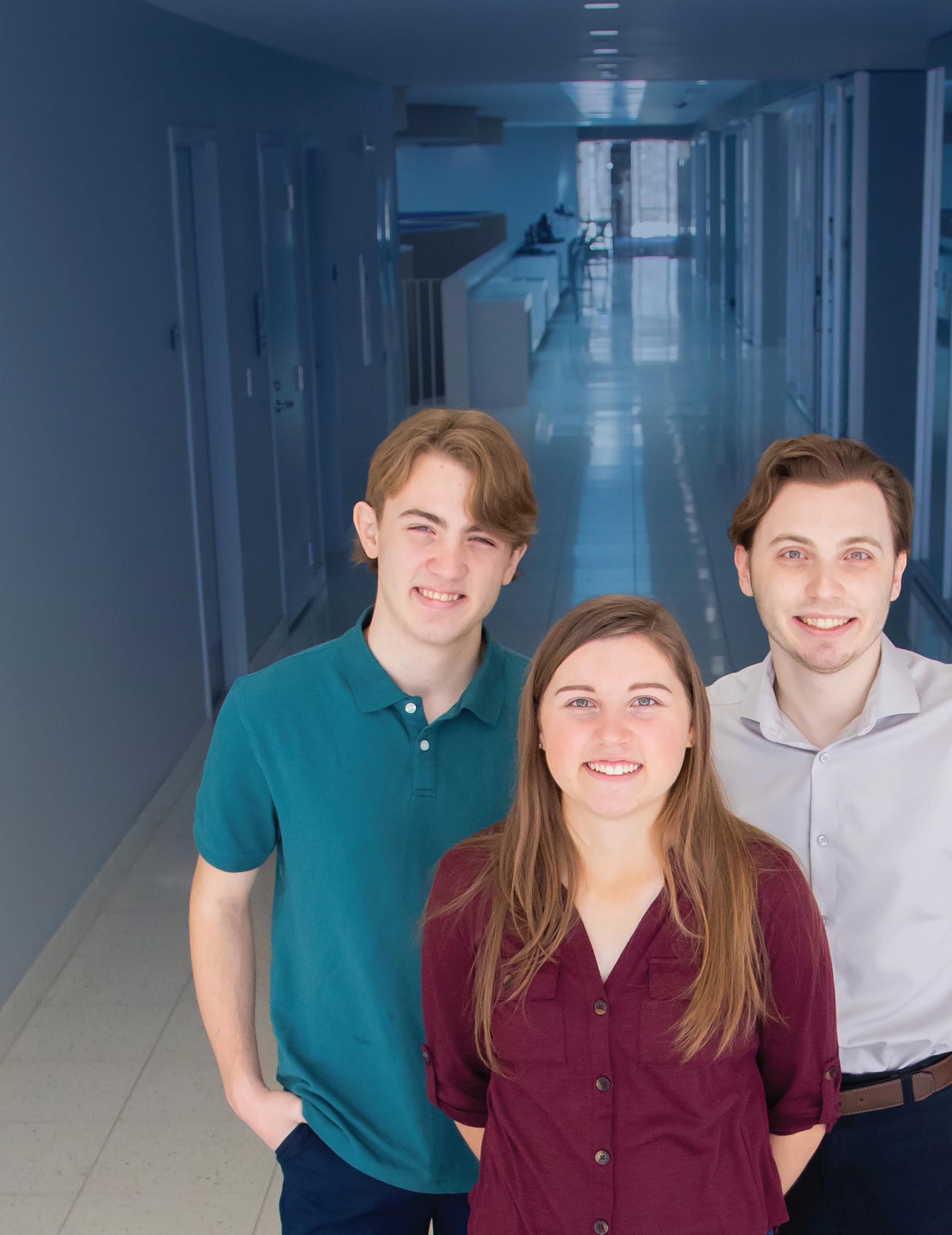
SiblingsStridein
When Braydon Dobos, the youngest of three siblings, enrolled in College Credit Plus courses at Lorain County Community College during his junior year at Oberlin High School, he said he was simply “following suit.” Both his older siblings, Megan, 20, and Cameron, 25, took College Credit Plus (CCP) classes during high school, earning 58 and 69 credits respectively.
Braydon, 17 and now a high school senior, is in stride with his siblings, having already earned 42 college credits. Altogether, the program has saved the family thousands in college tuition.
“Supporting our kids taking CCP classes was a critical step toward making their bachelor’s degrees more affordable later on,” says their mother, Amanda Dobos. The financial benefit of taking CCP courses is undeniable, but for these siblings, it was just the beginning. Each has used their first LCCC introduction to make lasting career connections.
“We love the collaboration LCCC has with local employers,” says their father, Ed Dobos. “Our kids have been educated in skills that have a direct, positive impact on them and our community.”
A snapshot in time shows just how well LCCC has prepared each student for their future, no matter what it holds.
Continued on next page
15 opportunity I Siblings in Stride
High school senior with a post-grad plan
Braydon’s siblings say he’s the most mechanically minded of the three. As children, his LEGO® creations took first place in the family.
“He would be making fully constructed battleships,” Cameron recalls. “I’d been so happy with my little creation, but then I’d look over at his and think, oh, he knows what he’s doing.”
That mechanical mind, coupled with career exploration through LCCC’s College Tech Prep, led Braydon to an early post-graduation plan. In fall, he plans to enroll in LCCC’s Bachelor of Applied Science in Microelectronic Manufacturing (MEMS) program. The pathway, which is a hands-on program with core content in Printed Circuit Boards, is the perfect fit.
“I like that it’s precision work and mechanically centered,” he says. “And when I learned I could earn my bachelor of applied science in the program, I knew it was something worth checking out.”
Because of CCP, Braydon has done more than check out the program – he’s got a solid head start. Braydon added that he’s already preparing his MEMS-focused
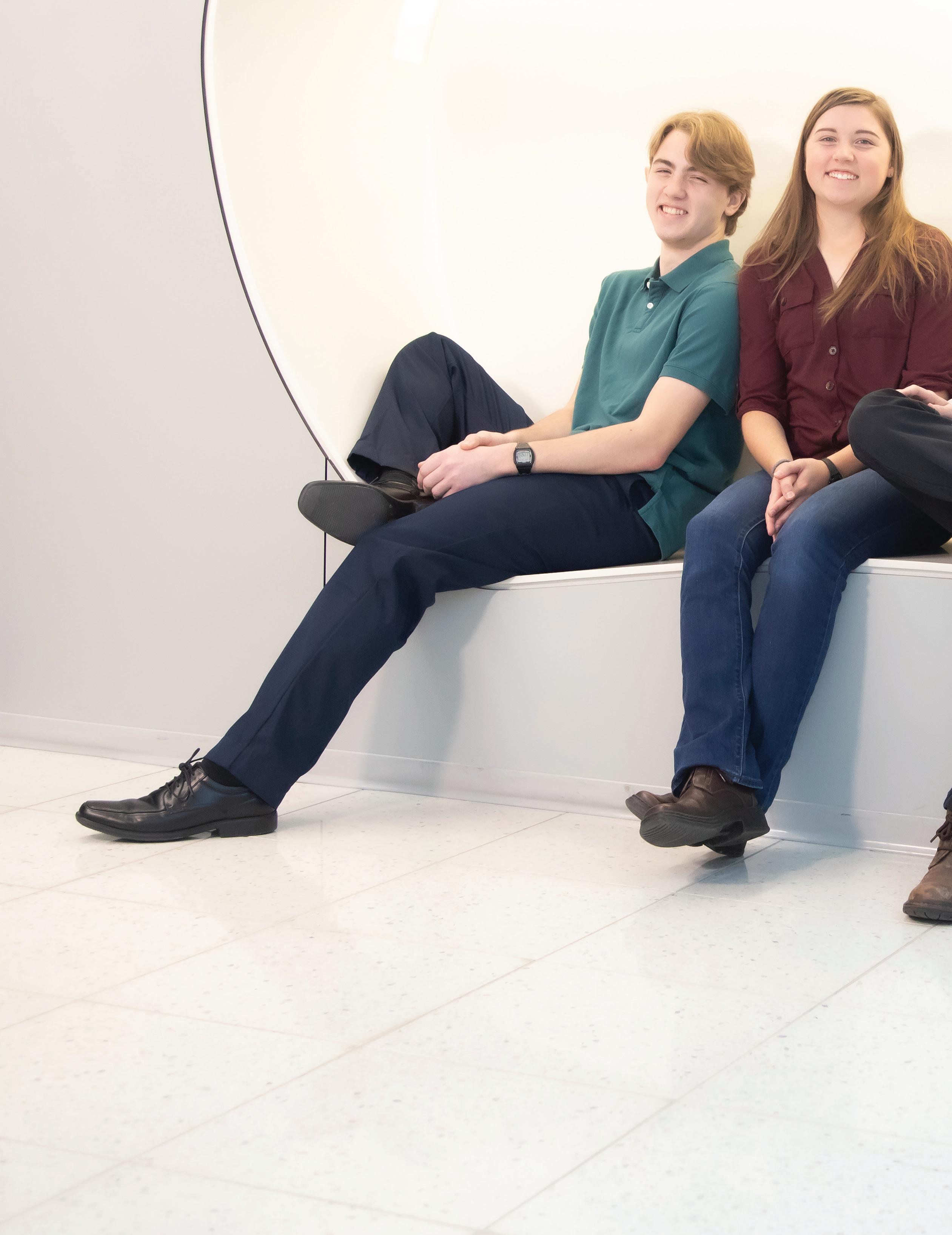
16 Lorain County Community College
LCCC AND UNIVERSITY PARTNERSHIP STUDENTS AND GRADAUTES
BRAYDON, MEGAN AND CAMERON DOBOS
VIDEO
“We found opportunities at LCCC that we wouldn’t have been able to get otherwise.”
Cameron Dobos
Braydon
Megan
resume. Not because he needs it to get into the degree program, but because he’ll put his classroom and lab lessons into practice with the program’s required work-based learning credit. Luckily, his sister Megan knows all about work-based learning.
University Partnership student with opportunities knocking
In the Dobos family, Megan is known for trying lots of new things, and excelling at just about everything she tries.
“She played tennis, basketball, and ran cross-country,” Braydon says. “She would try everything to find out what she enjoys doing.”
So, when Megan needed to apply her aptitude for experimentation to workbased learning, she was prepared. With the help of a STEM-focused Choose Ohio First Scholarship, Megan enrolled in The University of Toledo’s Computer Science and Engineering program through LCCC’s University Partnership. Like so many LCCC career Pathways, the rigorous engineering program requires at least one year of work-based learning. Megan recently began her second internship, this one with the NASA Glenn Research Center, where she’s working on two research projects. One is focused on regenerative fuel cells and the other on time-triggered Ethernet.
“I’m definitely learning a lot every day,” Megan says.
Beyond the day-to-day learning, Megan is getting a better sense of what she’d like to do after graduation. And while she’s not certain just yet, her mentor has some ideas.
“My mentor is encouraging me to consider NASA as a career,” she says. “We’ll see how it goes.”
Megan, who expects to graduate in spring 2024, has time to mull over her options. And she learned from her older brother Cameron that it’s never too late to pivot.
Multi-degree graduate making an IT impact
Among his siblings, Cameron is the best with computers; if only he’d known he didn’t like programming them.
He’s a 2020 University Partnership graduate, earning a Bachelor of Science in Computer Science and Engineering from The University of Toledo. But about halfway into the program, Cameron decided against a career in programming. Instead of switching majors, he added an associate of applied science degree in computer maintenance and networking to the two associate degrees he had earned through his CCP coursework.
“The University Partnership is so flexible and convenient that I was able to get my associate degree while taking part-time Toledo classes,” Cameron recalls. And he did all this while confirming his pivot through the required work-based learning.
“I found more enjoyment fixing things that already existed, rather than creating my own things,” Cameron says.
Three months after graduation, Cameron landed a full-time job continuing to do what he learned he loved. He’s now an information technology support analyst with Avient Corporation, a sustainable material solutions company headquartered in Avon.

As his younger siblings follow in stride, earning high-quality degrees that prepare them for in-demand jobs, Cameron knows all three have made the right higher education choice.
“We were interested in gaining learning experiences and skillsets for the careers that we wanted,” Cameron says. “We found opportunities at LCCC that we wouldn’t have been able to get otherwise.”
17 opportunity I Siblings in Stride
Cameron
UNDER THE MICROSCOPE
But those blood clots are deadly. The doctors who treated his brother wanted to break them up.
“Today, we have a drug called a tissue plasminogen activator, or r-tPA, that can be used to break down those clots, but that wasn’t available back then,” Kestler noted.
Instead, doctors prescribed aspirin.
“I went to see my guidance counselor about going to college and he didn’t seem to think I was college, material. ‘Oh, you’re going to college?’ he said to me with disbelief. He thought I was more likely to become somebody who would pump gas,” Kestler recalled. “I remember that day very well.”
The road to research
The Kestler family lived in a small house on 14 acres of farmland in a tiny place called Penfield, New York. Kestler was the middle child – an older sister and a younger brother.
In spring 1968, Kestler’s brother, Michael, age 9, caught rheumatic fever.
“We were all of the sudden catapulted into a new world of ‘What are we going to do?’” said Kestler, who was 10 at the time.
Rheumatic fever swept across the world in the late 1960s and early 70s. The fever’s greatest danger was the damage it could do to the heart.
“We were very scared at the time, like people were during the beginning of COVID-19,” he said, referring to the coronavirus outbreak. “My earliest recollection of doing anything medical or scientific was reading our family medical journal.”
And so it started, the boy who would one day become a leading author in HIV-AIDS research, tried to learn everything he could about his brother’s illness and how to treat it.
“The human body does something when it has a disease like that,” Kestler said. “It naturally tries to create blood clots to isolate the micro-organism in your bloodstream, to contain the infection.”
“I can remember him pounding down 20 aspirin a day,” he said. “That’s a massive amount of aspirin.”
His brother survived rheumatic fever. Today, he’s 63 years old and a retired postmaster with five grandchildren. “He has more grandkids than I do,” said Kestler, who doesn’t have any yet himself.
Honoring his mom
Kestler says his mother, Helen, was the rock of his family.
“I’ve always tried to pay my mother back because of the sacrifices and all the things she went through.” She passed away in 2000, but she’s never really left him.
“I imagine her in my classroom all the time today,” he said. “I like to tell jokes and things, and my audience is always her. I always imagine her in the back of my room.”
Harry needed his mom as a boy, and she needed him, too. “My dad suffered from mental illness,” Kestler remembered. “My mom had to basically do everything.”
As a teenager, Kestler became the only source of income for his family. He got a job at the local supermarket as a bag and stock boy. But his family life took its toll on his high school grades, and it led to a moment in the school’s guidance office he’d never forget.
Kestler started his education at Monroe Community College in New York. Driven by his brother’s sickness and his father’s mental illness, he chose to study science and psychology. After his start at the local community college, he earned his master’s and his Ph.D. at the University of Rochester, where he studied the genetics and regulation of E. coli.
Kestler then attended Harvard Medical School and studied HIV/AIDS.
“I wanted to save the world. I thought the HIV research was going to do that, and I was going to get a cure, a vaccine, and I was going to win a Nobel Prize,” he said. Kestler was a postdoctoral student at Harvard and then an instructor in its medical school from 1986 to 1991. He then accepted an appointment in 1991 at the Cleveland Clinic’s world-renowned Lerner College of Medicine as an assistant professor, and continued his work in HIV/AIDS research there until 1997.
Teaching the next generation
Harry Kestler is a pioneer in HIV/AIDS. “We did have some major accomplishments,” he said while sitting in his lab at LCCC, where his HIV/AIDS research continues today.
Among those accomplishments is demonstrating that AIDS was caused by a virus. “There were a lot of conspiracy theories about its origins,” he said.
18 Lorain County Community College
Nicknamed “The Micro Prof,” LCCC microbiology professor Dr. Harry Kestler has spent more than three decades studying infectious diseases. Now he’s guiding the next generation of researchers.
LCCC PROFESSOR VIDEO
DR. HARRY KESTLER
MICROSCOPE
He also came up with a live attenuated vaccine by accident. “It dropped into my lap and I said this is probably something big. Of course, that paper still gets people referencing it,” Kestler said. And at the Cleveland Clinic, his team came up with a second vaccine. “Believe it or not,” he said as referenced his lab at LCCC, “we’re working on that still today in this room.”
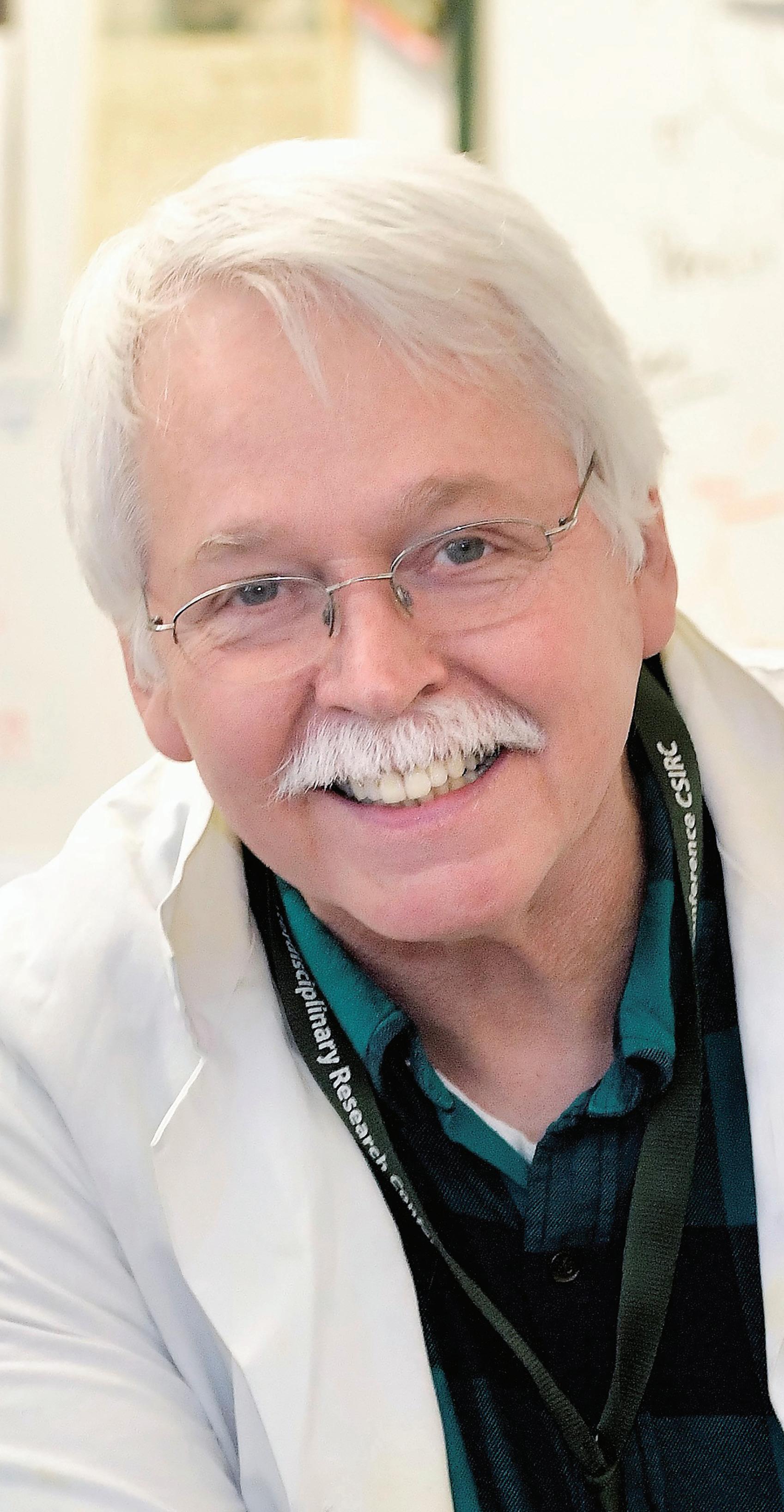
Today, Kestler’s students study the CCR5 gene, or suicide gene, as it’s known. “Our goal is to create gene therapy that would not require a bone marrow transplant. It would require just introducing the gene into the patients, and hopefully, we can remove HIV from the earth,” he said.
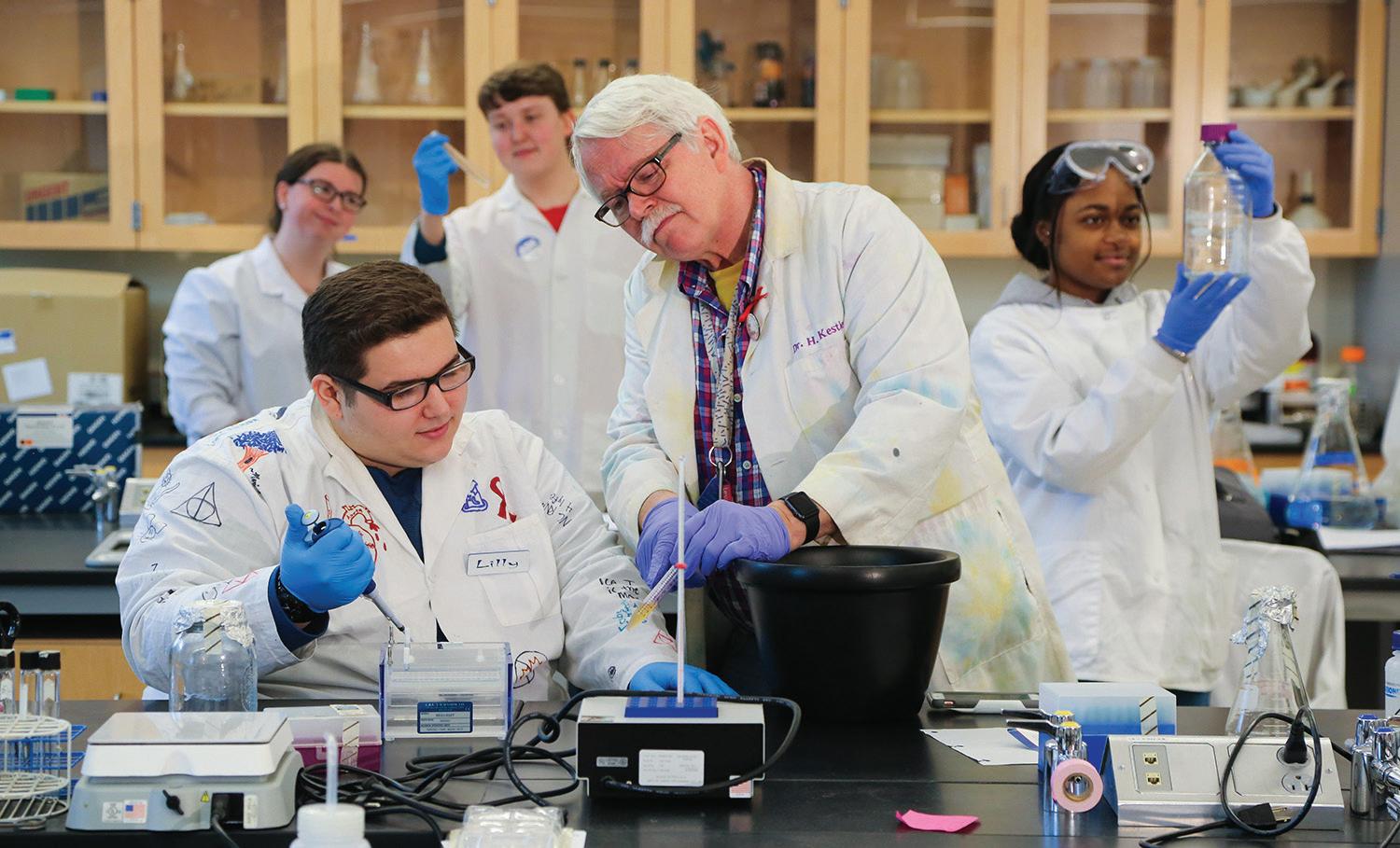
Kestler hasn’t yet won that Noble Prize, but he still has a version of that goal.
“I have a big army of students who, I think, a couple of them are going to win the Nobel Prize,” he said. “And I think I’d get at least a little bit of claim on that prize.”
19 opportunity I Under the Microscope
Quiet but Mighty
Nursing grad and Florence Nightingale award winner Bianca Young is prepared to advocate for future patients
Bianca Young never saw herself becoming a nurse. It was a dream job when she was young, but the 35-year-old earned a bachelor’s degree in social work and had built a rewarding career in the field. Still, when Young was presented with an opportunity to chase her childhood dream, she heard one voice in her head.
“My mom always says, ‘nothing beats a failure but a try,’” Young says. “I decided to go for it.”
Young had recently moved from Texas to Oberlin, and being just a few hours shy of earning a master’s degree in sociology, she attended a college fair to continue her education. When she arrived, she said the room was filled with nursing schools. Nothing else. She took it as a sign and, after some research, chose Lorain County Community College.
“I picked LCCC because I felt like it would cater to my education,” she says. “The professors were invested in my education and wanted me to succeed.”
LCCC’s Associate Degree in Nursing program, which Young says accomodates working students like her, exceeded her expectations. Her favorite classes were held in the Health Simulation Center at LCCC’s University Partnership Ridge Campus.
“The simulations prepared us for what things are going to be like in real-life situations,” Young says. “In class, we’re reading, talking and discussing. It’s different putting those discussions into action.”
Young also experienced several hospital environments as part of the college’s clinical rotations. The exposure helped Young narrow her specialty to becoming an Intensive Care Unit nurse. Eventually, she’d like to be a nurse anesthetist.
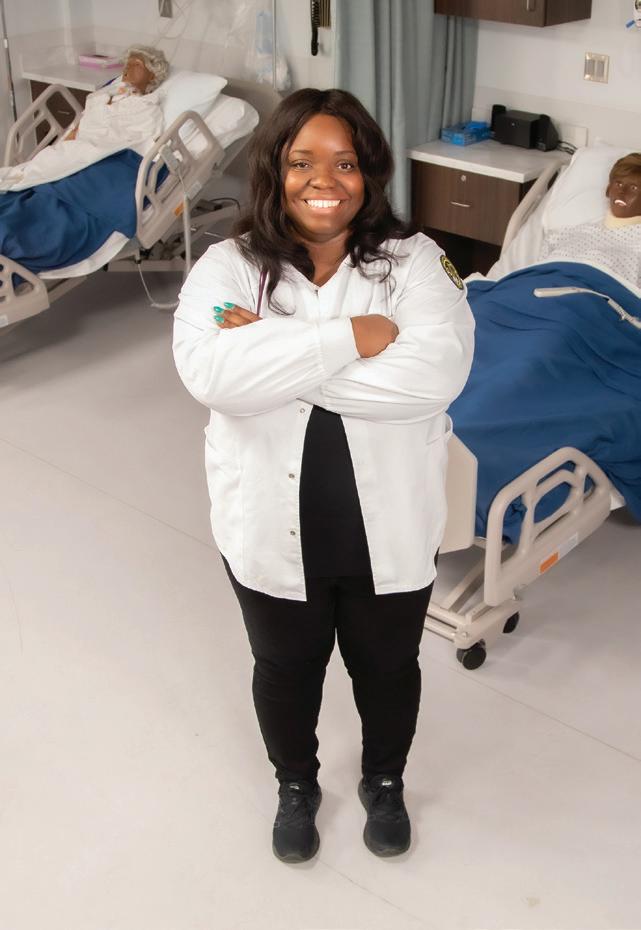
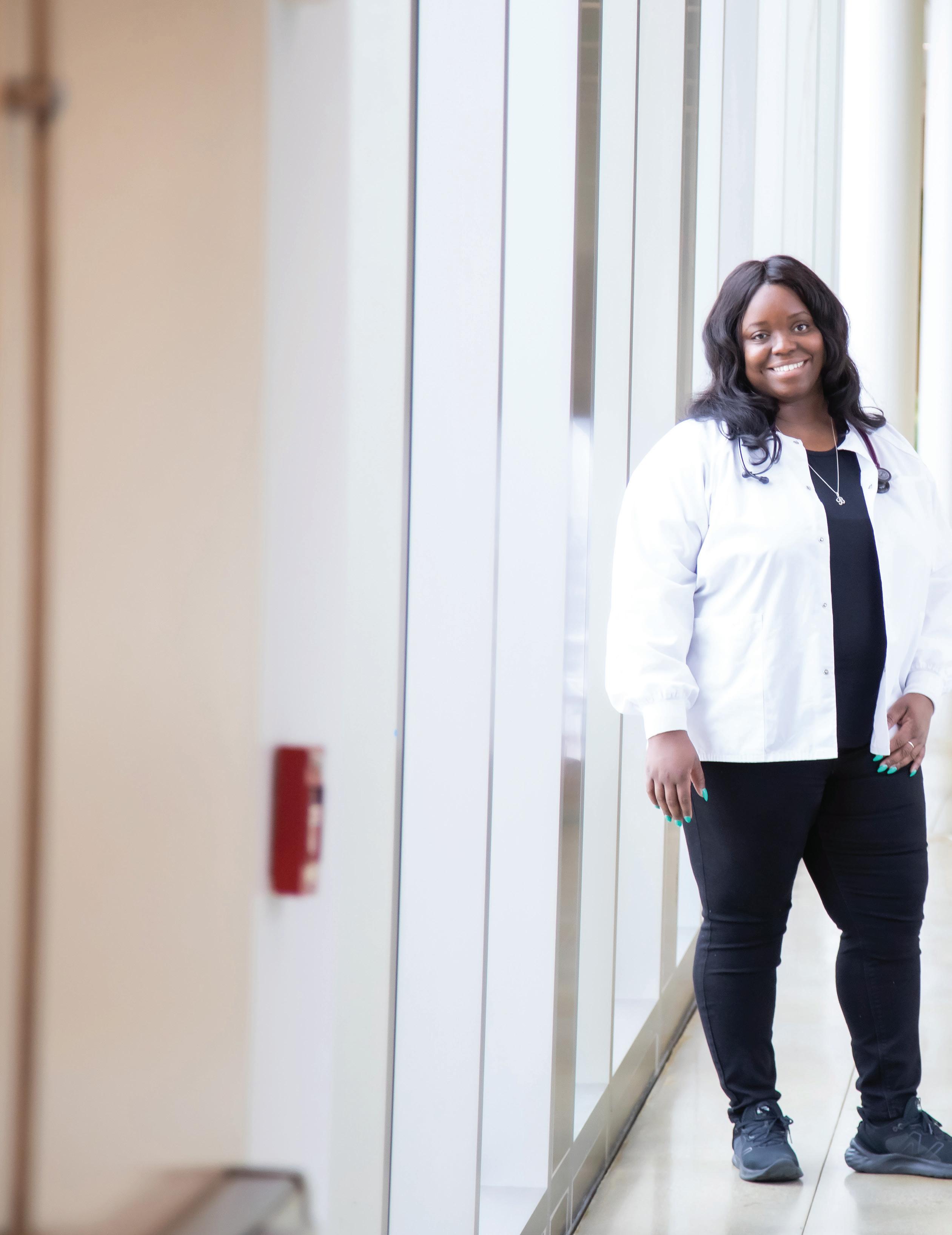
“I hope my patients say I’m somebody who speaks up for them when they’re not being heard,” Young says, “that I advocate for them, push for answers for them, and communicate well.”
This mindset – stemming from her past career – set Young apart when LCCC instructors made their Florence Nightingale award nominations during the December 2022 graduation ceremony. Young was the main campus award winner, and Nanci Berman, DNP, RN, the LCCC nursing instructor who nominated Young, described her as “quiet but mighty.”
“She has been the advocate for so many in her previous role,” Berman says. “And now she’ll have the capability to serve those in her care as a nurse with a different mindset than most nurses.”
20 Lorain County Community College
BIANCA YOUNG VIDEO
LCCC GRADUATE
PATHWAYS TO BECOMING A REGISTERED NURSE
Traditional Nursing Program
Why Choose LCCC?
• LCCC grads are the top choice of local hospital systems
• One of the Highest NCLEX pass rates in Northeast Ohio
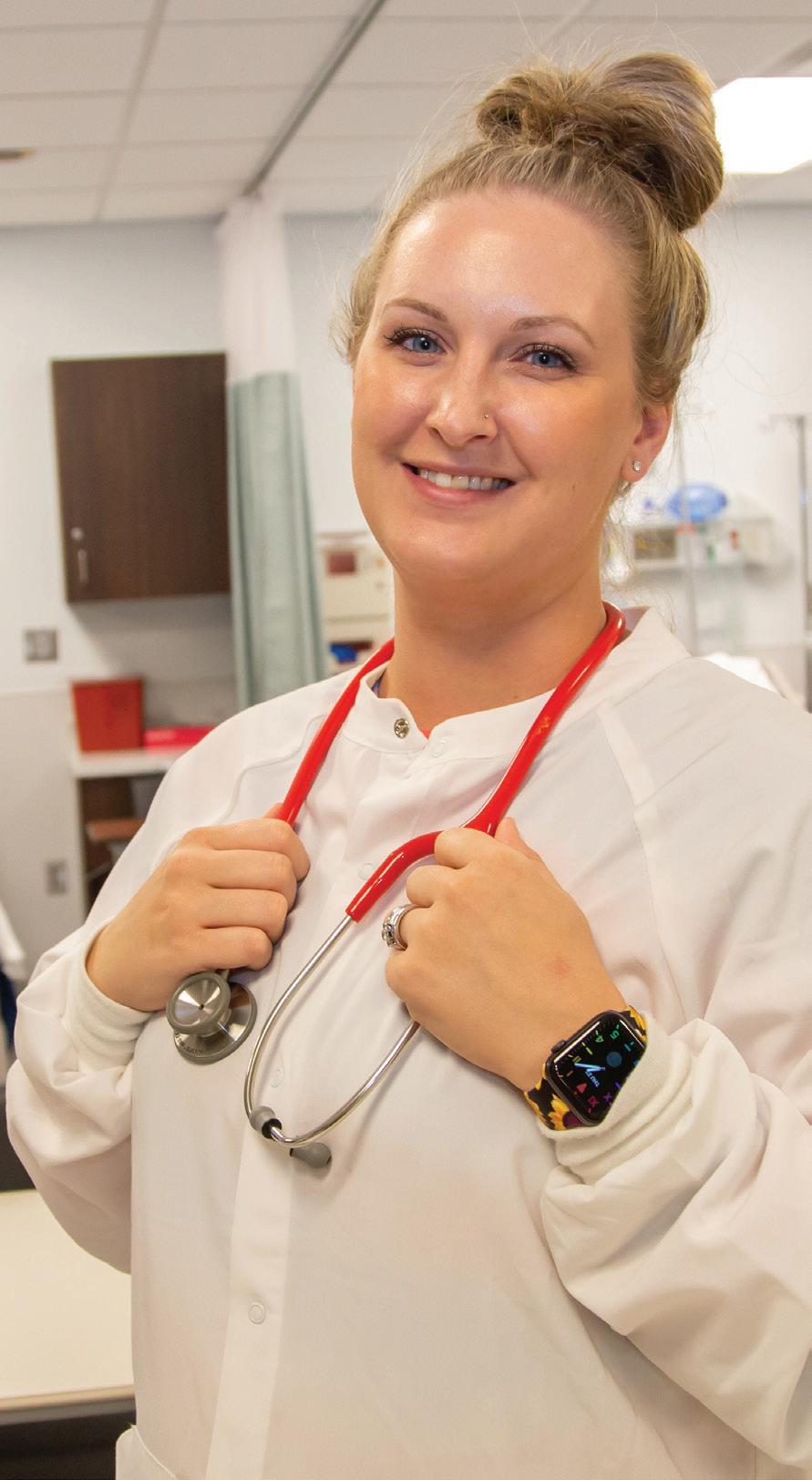
• Highly educated and credentialed faculty with direct nursing experience
• Support services designed to help you excel
• Accredited by the Accreditation Commission for Education in Nursing
Great fit for recent high school grads – you can even take College Credit Plus courses while in high school to prepare!
Licensed Practical Nurse to Registered Nurse
Take your nursing career to the next level.
Paramedic to Registered Nurse
Use your relevant work experience to upskill your career.
1 2 3
• Two campus locations – Elyria and BGSU Firelands
• Pathways to Bachelor of Science in Nursing available through the University Partnership
Spring Semester Start –apply by September 5
Fall Semester Start –apply by February 5
Selection is competitive, based on academics and completion of prerequisites.
Contact us to meet with an LCCC nursing advisor and design your path to a successful nursing career. 440-366-4032 or lcccadvising@lorainccc.edu
GLOBAL IMPACT
Trace-and-authenticate microchip company finds high-tech manufacturing home on Lorain County Community College campus
When Bill Eibon was looking for a facility where p-Chip Corporation could manufacture and test its tracing microchips, he searched all over North America. It turned out, the ideal, hightech destination Eibon was looking for was Lorain County Community College.

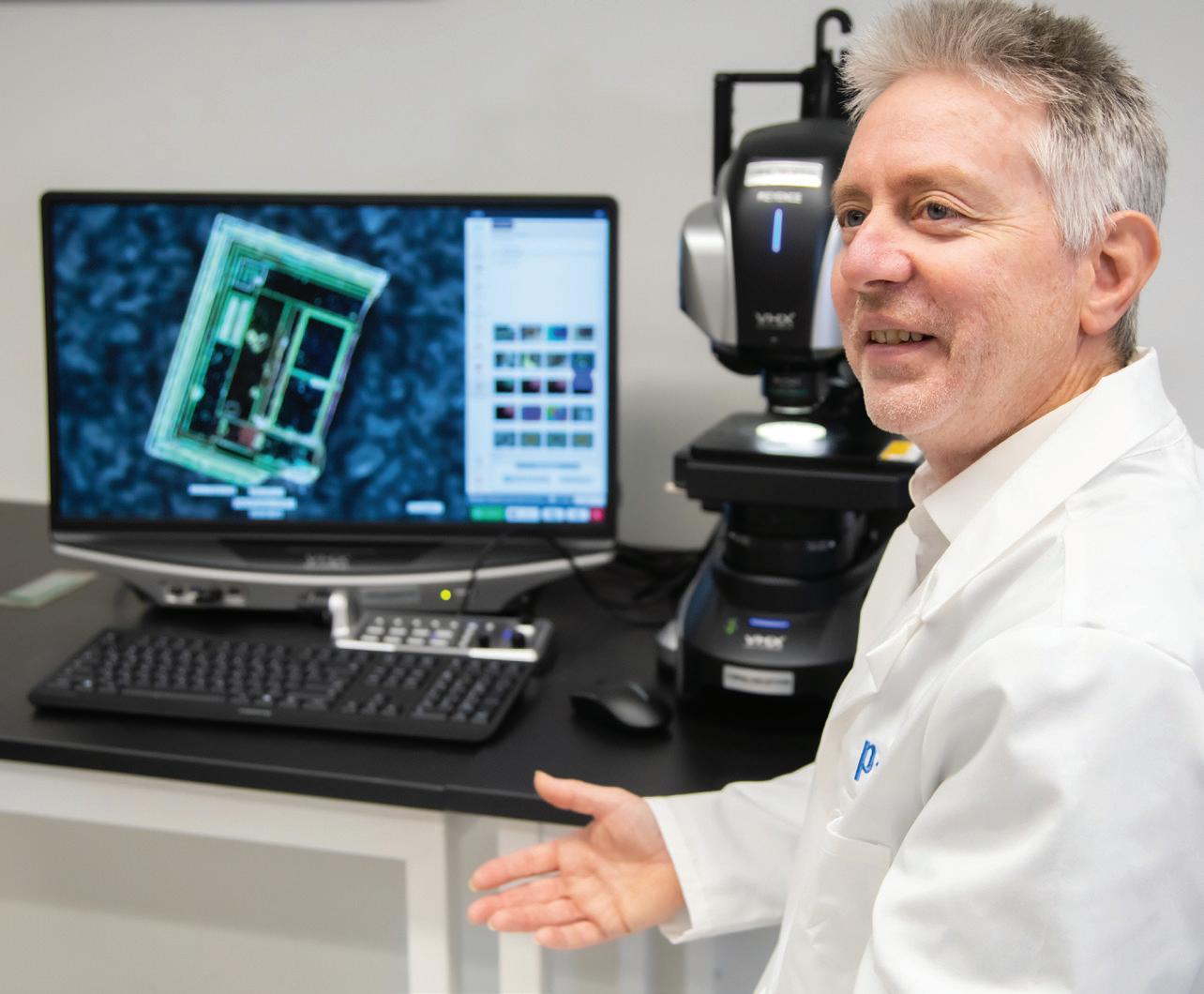
Eibon is chief technology officer of p-Chip Corporation, which manufactures a micro-transponder – about the size of a grain of salt – that helps businesses trace and authenticate their products. Companies around the world contract with p-Chip to track and authenticate just about anything, from auto parts to medical equipment and more.

When Eibon, a 1985 graduate of Lorain County Community College, revisited the campus as a potential location, he was intrigued. His alma mater’s business support system had evolved alongside the changing needs of today’s high-tech manufacturing companies. And when it came to lab space and training within the rapidly emerging microchip sector, LCCC was a national standout.
“I was blown away by what LCCC was doing,” says Eibon. “We make computer chips. We do wafer handling and testing. And that’s done here at this college.”
Access to tech-savvy students
In 2021, through the business recruitment efforts of the Great Lakes Innovation and Development Enterprise, Eibon moved p-Chip’s lab space into the Richard A. Desich SMART Commercialization Center for Microsystems. It’s the same building that houses LCCC’s microelectronic manufacturing (MEMS) education and training program.
“The MEMS program in and of itself was one of the main reasons we fell in love with this site and what LCCC can offer,” Eibon says.
LCCC’s Associate of Applied Science and Bachelor of Applied Science degrees in MEMS are industry-tailored and hands-on, with core curriculum focused on printed circuit board (PCB) and microelectronic manufacturing, design, assembly and prototyping. Both boast 100% job placement for graduates, in part because of the required work-based learning experience. And now, with p-Chip on campus, LCCC students have more employer options, and p-Chip has a pool of talent to choose from.
“Everything about our proprietary chip and readers, the software inside of it, the printed circuit board design, all the manufacturing, it’s all in-house,” Eibon says. “So having students who know how to handle electronic components, how to design build and test PCB prototypes is important to us.”
22 Lorain County Community College
P-CHIP
VIDEO GLIDE TENANT
CORPORATION
IMPACT
A better place to test
The p-Chip technology is not only tiny, but also versatile and affordable. Eibon says the company’s microchip can trace nearly any product through its supply chain from manufacturers sourcing raw materials to the end user. And to ensure privacy, the chips can only be read in person with a controlled, p-Chip-issued device.
“All the information about that object, where it’s been, how it’s made, who’s owned it, is locked in a digital fashion,” Eibon says. “That data can be stored on computers, LAN networks, in the Cloud, or on Blockchains.”
Because these chips can be placed in and on anything from automotive parts to food packaging to medication, the team is constantly testing to ensure the chips can withstand the various elements they’ll be exposed to. To do this, Eibon contracts with SMART Microsystems, an organization also on LCCC’s campus that performs testing and inspection for microelectronic subassembly manufacturing.
“Within a few minutes, I realized I need to be doing my testing with SMART Microsystems,” Eibon says. “It’s not just about the simplicity of cutting your cost by not shipping stuff around the world to do the tests. You can have conversations with people. Changing samples means let’s meet downstairs.”
As worldwide brands embrace p-Chip’s capabilities, Eibon says he is proud the company’s global impact is rooted in a community college campus.
“We could have taken this company anywhere,” Eibon says. “But it’s here, and it’s here for a reason.”

LOCAL COMMITMENT
23 opportunity I Global Impact Local Commitment
“ We could have taken this company anywhere. But it’s here, and it’s here for a reason.”
A Powerful
How Kwabena Agyemang’s appreciation for his family’s past fuels his ambitious academic future

Whenever Kwabena Agyemang finds himself facing a challenge, he reminds himself of one thing: the hurdles his parents have overcome. More than 25 years ago, Agyemang’s parents left their home in Ghana to begin the life they dreamed of in the United States. To Agyemang, it was the ultimate sacrifice for their future children.
“They left behind their parents, knowing they would likely never see them again,” he says.
Despite the challenges of uprooting the lives they once knew, Agyemang says his parents remained committed to their dream. And, as if feeling the weight of the burdens they once carried, so does he.
“For me to achieve success would show them that not only do I appreciate what they have done for me, but that I did not put to waste their time, effort and sacrifices,” he says.
This powerful perspective on his life, education and career led to Agyemang earning the honor of being named a Coca-Cola Bronze Scholar.
Degrees without debt
The 20-year-old dreams of one day improving patient outcomes in medicine by becoming a healthcare data analyst. It’s a career choice that requires years of higher education and training. To meet this goal, Agyemang began taking several College Credit Plus courses before graduating from North Ridgeville High School in 2021.
24 Lorain County Community College
LCCC STUDENT
KWABENA AGYEMANG
“The foundation that I built at LCCC will help me get to where I need to be.”
VIDEO
Powerful Perspective
“I wanted to get a head start,” he says. “Through LCCC’s College Credit Plus program, I was able to take several classes, for free, before high school graduation.”
The early LCCC start means he’ll earn both associate of science and associate of arts degrees in May 2023. And thanks to the Diversity Incentive Award scholarship, Agyemang will earn those degrees without any debt.
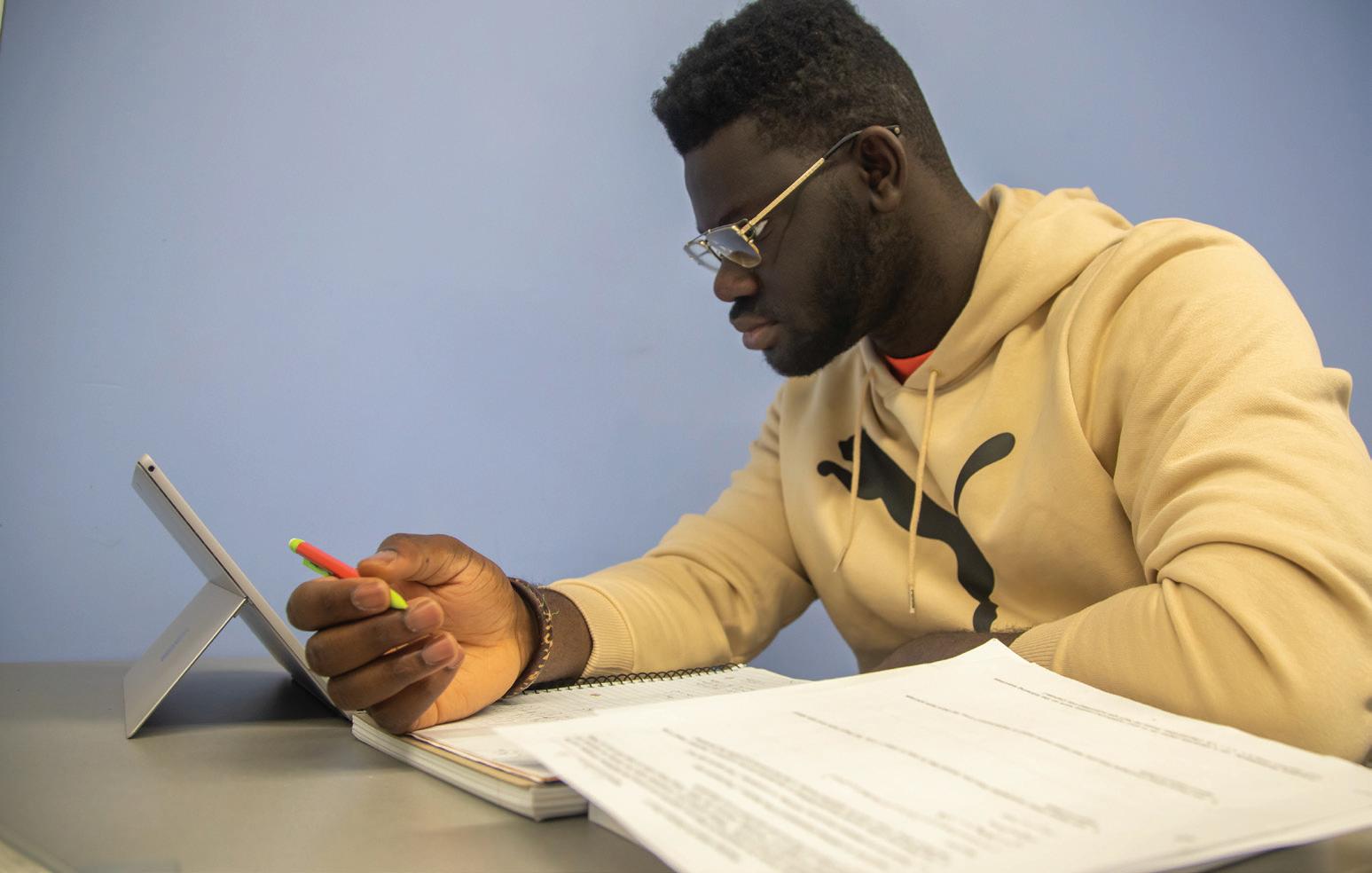
After graduation, he plans to transfer to a four-year institution to earn a bachelor’s degree in applied mathematics, and then it’s on to his master’s degree.
“I plan to transfer to an institution that shares my values and will help me grow to be the best version of myself,” he says. “The road ahead won’t be easy, but I know the foundation that I built at LCCC will help me get to where I need to be.”
The honor of volunteering
Agyemang might have hastened his time to earning two degrees, but he has made the most of his two years on the LCCC campus. The math enthusiast serves as treasurer of the Phi Theta Kappa Honor Society and co-lead for its Honors in Action project. In that role, Agyemang has worked on his leadership and communication skills, while making a positive impact on his campus community.
“PTK has provided a catalyst for me to grow and connect with my peers,” Agyemang says. “Our work is improving our campus, community, and the world.”
Agyemang says his drive for volunteer work started in third grade when he was introduced to peers who were on the autism spectrum.
“I became good friends with one peer of mine who was on the autism spectrum and began to help out in his special education classroom,” he says.
The next school year, Agyemang proposed and organized a fundraiser to raise money for the regional Special Olympics. His idea – selling customizable paper strips for a schoolwide paperchain – earned enough money for a full class of students to attend.
“By creating this volunteer project at a young age, I was able to see the positive impact that one person can have by simply taking action,” Agyemang says.
A simple equation
As Agyemang navigates through his future education pathway, he says helping those in need remains at his core.
“Helping others has helped me to embrace people’s differences,” he says.
“And I understand the importance of using my leadership and abilities to better others.”
His academic abilities certainly lie within the combination of mathematics and healthcare. Since March 2022, Agyemang has worked as a pharmacy technician at CVS Pharmacy. He says after COVID-19 caused a shortage of pharmacy technicians, he knew he had to help.
“With less pharmacy technicians, there are longer waiting times for prescriptions,” he says. “Many people need their prescriptions at a specific time in order to keep their health in check.”
With every interaction, Agyemang can see the positive impact he’s already making as he moves toward his career goals. And sometimes, he says, despite the complicated and important mathematical equations that lie ahead for him as a healthcare data analyst, the greatest results can still come from the simplest of actions.
“I’ve learned many lessons on how to interact with others and serve people through a stressful time in their lives,” he says. “I’ve learned the power of a kind word and a smile.”
25 opportunity I A Powerful Perspective
Turning a Loss Into a Gain
After losing her job
Jasmine Jackson enrolled in LCCC’s cyber and information security program. Its earn-andlearn format had her back to work fast.
Jasmine Jackson knew the freightforwarding company she worked for was in trouble. That didn’t make losing her job any easier when the business shut down in January 2022. But it did provide an opportunity.
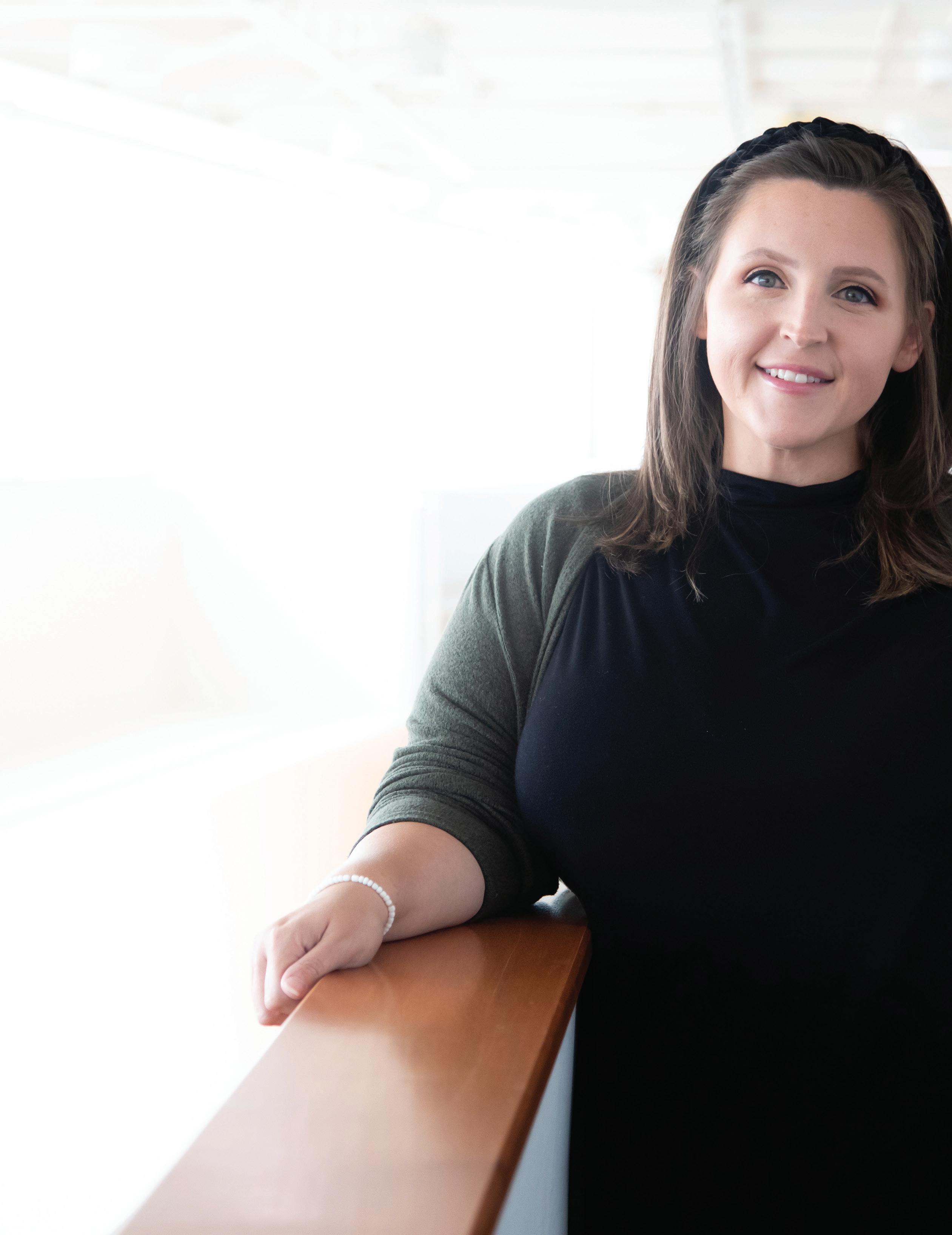
“Change can be terrifying, but it was time,” Jackson, 31, said.
The Elyria resident had already signed up for classes at Lorain County Community College, in search of a career where she could increase her income and work remotely. After some research, she focused her coursework on an Associate of Applied Science in Cyber and Information Security.

“The tech field is ever-changing, always growing, and always in need of people,” Jackson said.
She’s right. The cyber security industry is evolving alongside rapid technological developments, generating jobs at a faster pace than the national average. And while Jackson was aiming for a post-graduation job, the pathway’s built-in earn-and-learn format, which requires students to split their time between coursework and industryspecific employment, had her back to work quicker than she expected.
Shalamar Lawrence, career development specialist at LCCC, met with Jackson to discuss the process and its potential.
“Work-based learning is like a long interview where you could potentially receive a job offer from the employer,” Lawrence said.
Lawrence helped Jackson polish her resume and practice her interviewing skills. And in May 2022, Jackson began a paid internship at MCPc, a global software security and device company. As a secure operations center analyst intern, Jackson monitors alerts from client networks and follows procedures for troubleshooting and escalation.
“I’m gaining on-the-job experience and earning money,” Jackson said. “It’s so valuable and has helped me get the most out of my degree.”
26 Lorain County Community College
LCCC STUDENT
JASMINE JACKSON
“With the low cost of LCCC to get your degree, and all that they offer, anyone can end up with a great lifelong career.”
Fast-Track to a NEW CAREER! • Earn certificates and industry-recognized credentials • Work with a dedicated academic and career coach • Gain hands-on experience • Career and interview coaching and job and employer connections Contact Enrollment Services 440-366-4032 lcccadvising@lorainccc.edu Fast-Track Programs Credit and non-credit options available 16-Week Programs • Business and Entrepreneurship • Computers and IT • Engineering and Manufacturing • Health and Wellness Two-Semester Programs • Business and Entrepreneurship • Computers and IT • Education • Engineering and Manufacturing • Health and Wellness • Human/Social Services and Public Safety • Science and Mathematics FREE! Start Today! For a complete list of programs, visit lorainccc.edu/fasttrack
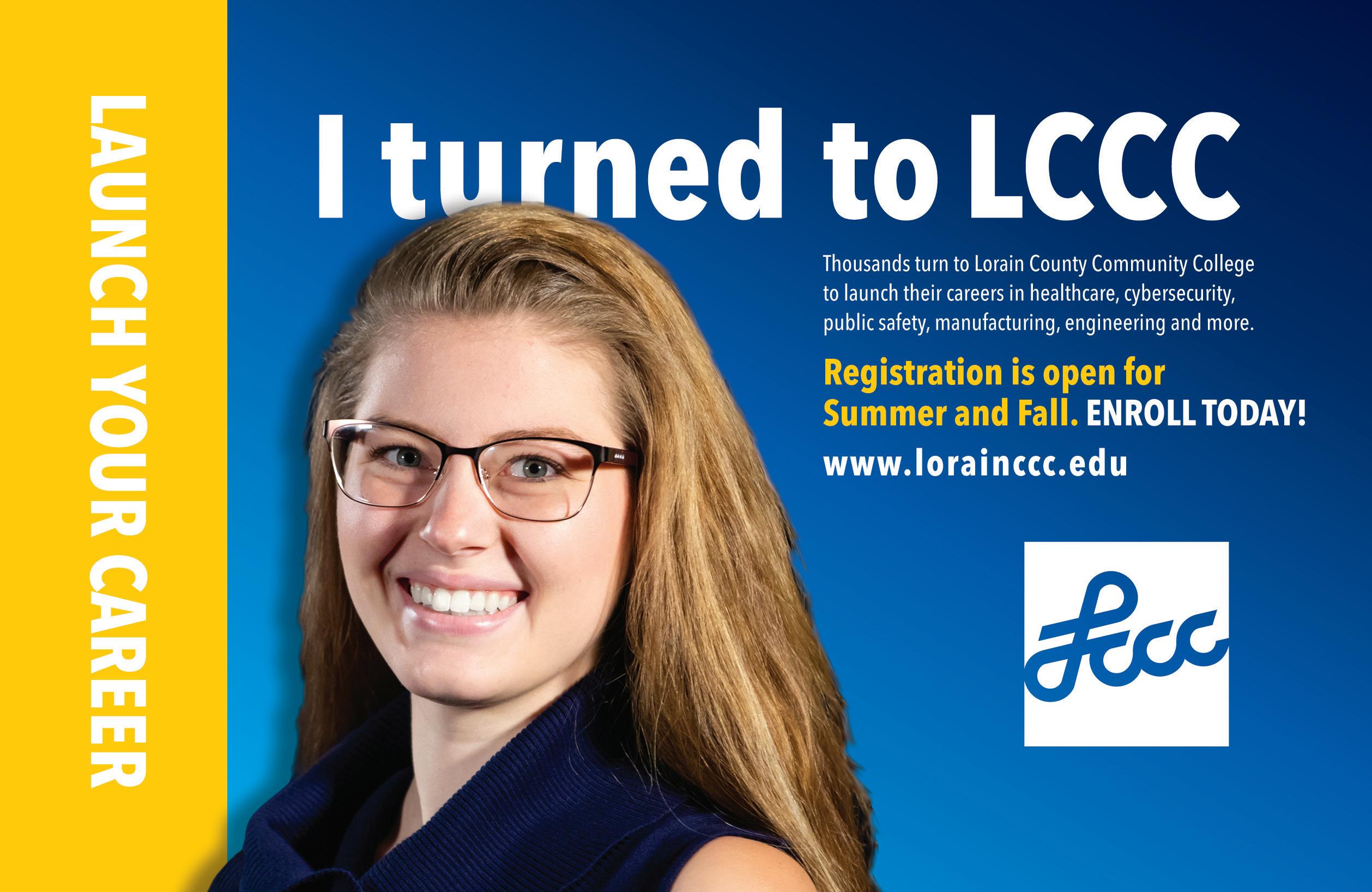 1005 North Abbe Road Elyria, Ohio 44035
1005 North Abbe Road Elyria, Ohio 44035






 4 Lorain County Community College
SARIANA RIVERA
4 Lorain County Community College
SARIANA RIVERA





























 1005 North Abbe Road Elyria, Ohio 44035
1005 North Abbe Road Elyria, Ohio 44035